#and what i’m really after which is experience doing an independent literary review at an academic level
Explore tagged Tumblr posts
Text
officially 1/9th of a way through the first draft of my final paper for environmental science!
#planning to get through 1/3 a week#so i’ll present my draft on the 11th of next month#then have 3 weeks to refine then turn in!#this is a bigger project because it’s an independent literary research paper that i made a thesis for and proposed to my professor#as an honor’s project and as a replacement for the original final paper#which will give me honors credit for this course#and what i’m really after which is experience doing an independent literary review at an academic level#so far it’s looking to be about a paragraph per page#so i might need to add or do something a little different to meet page requirements#but we’ll burn that bridge when we get to it
2 notes
·
View notes
Text
Try Audio Books for Book Bingo!
Thanks to the recent Seattle Times article with the reminder that listening to an audio book constitutes reading a book for the purposes of Book Bingo, I was able to use some of my recent audio book “reads” to fill in a few Book Bingo squares!
For me, audio books have been a fun way to squeeze in a few more titles per month. I listen when I work out, on my way to and from work, when I’m knitting, and, when I’m really into an audio book, on my lunch breaks. I especially like listening to YA (bonus points if they have dual narrators, so fun!), romance, and some nonfiction, which is often narrated by the author, as you’ll see below. Every so often I’ll add in a literary fiction, like Maggie O’Farrell’s Hamnet. The pleasure of truly excellent prose spoken aloud adds a depth to my experience of the story. I can’t listen to an audiobook as fast as I can read a book, so it gives me more time to think about the characters, what is happening in the plot and speculate about what might happen next. When I listened to The Dutch House (read by Tom Hanks) I was continually surprised by the twists of the plot. When I listened to Gold Diggers, I was able to step away long enough to remind myself these were fictional characters, because I thought they were making so many bad choices!
Island Books partners with Libro.fm, a local independent audio book platform. Readers who want to support Island Books and get downloadable audio books can purchase a monthly subscription, or buy audio books a la carte, while designating their chosen independent bookstore. Most of our staff uses the Libro.fm app, and whenever I personally mention in a recommendation card or in a blog that I listened to the audio book, it has been exclusively using Libro.fm.
Here are my recent audio book “reads” that are helping me fill in my Book Bingo!
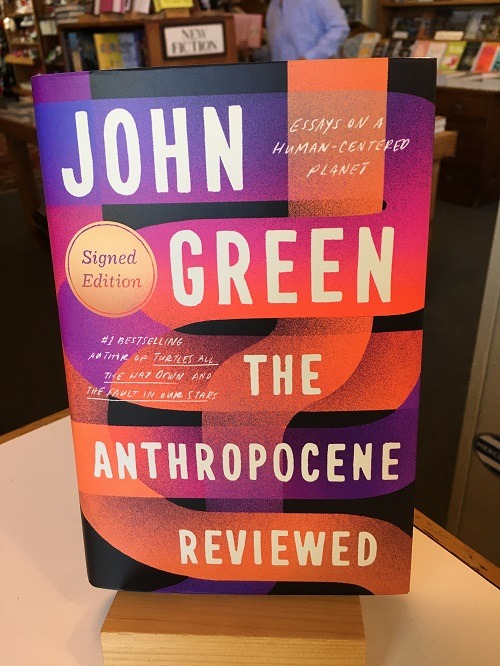
The Anthropocene Reviewed by John Green
I’ve read several of John Green’s YA titles, (The Fault in our Stars, Looking for Alaska, and Turtles all the Way Down) and heard he had a podcast, but never listened to it. So when I saw he had a book of essays coming out, and that he was reading the audiobook, I thought it would be a nice change of pace from all the YA rom-coms I’d been devouring. There’s something lovely about hearing an author read their personal essays aloud, knowing that they are acutely aware of the intent they are trying to convey to their reader/listener. Having no preconceptions, I found this a delightful ramble through John Green’s thoughts about things as varied as the Indy 500, Kentucky Bluegrass (which I initially thought was the music genre and was confused as to all this discussion of lawn care), and Air-Conditioning. Green gives a concise deep dive into each subject, but always circles back to his own, quite moving, personal experience. The through line in each, either explicitly or not, is the disruption of the Covid pandemic, and he imbeds in each essay a snapshot of whatever uncertainty we were all contending with at that particular time. I used The Anthropocene Reviewed for my “Poetry or Essays” square.

One Last Stop by Casey McQuiston
I know this has already been one of the big books of the summer, especially among the late teens and early twenties readers. I had it in my to listen queue when I found it listed on the Seattle Public Library’s “Peak Picks” page - perfect way to fill in that square! I listened to the bulk of it on a recent road trip and, for me, the audio book was the perfect way to submerge myself in the story without overthinking the moments that slightly strained my credulity. August has recently moved to New York City as a way to hopefully finish college, extract herself from her mother’s obsession with a particular cold case, and be alone without feeling lonely. She stumbles into an apartment situation with a handful of quirky characters, a job as a waitress at a pancake restaurant, and a commute on the Q train to school. Which is where she meets Jane. August has a crush at first sight, especially after Jane rescues August with a scarf to cover her coffee ruined shirt. But August starts to realize there’s something different about Jane - she listens to cassettes on a Walkman, she’s always wearing the same outfit, and she’s always, always on the Q train whenever August gets on. This is certainly a romance, and there’s plenty of steamy moments, but the relationships between August and her roommates moved me the most as they slowly break down her protective shell. August struggles to let herself love others, and to let herself be loved, so listening to her gradual change was tender and sweet. I loved seeing her find her people, a place where she felt like she belonged, and realize how full and good her life could be. One Last Stop would also work for Romance, QTBIPOC and Coming of Age Book Bingo squares.

The View Was Exhausting by Mikaella Clements and Onjuli Datta
This one I didn’t start for any particular Book Bingo square, but The View Was Exhausting would work for Romance, Beach Read, QTBIPOC, or Recommended by a Local Bookseller (me!). All I knew going in was it was a romance with the fake dating trope and set in the upper echelons of Hollywood society. I figured it would be a fun escapist look behind the scenes of a lifestyle a million miles away from my own. Whitman “Win” Tagore is an A-list British Indian actress chasing after a coveted role in a Hemingway film adaptation when scandal erupts in her personal life. She retreats to Saint-Tropez to do damage control by calling in her on again off again “boyfriend”, society darling/male model Leo Milanowski. The world thinks that Win and Leo have a love story for the ages, but since the moment they met at age 20, it’s been about public image - fake dating on a global stage. First I was captured by narrator, Tania Rodrigues, and her precise English accent that she molds to fit every character. Her voice reading Mikaella Clements and Onjuli Datta’s words made me feel like I was in each exotic location. Second, the whole concept raised really interesting questions about the double standard for men and women in the film industry, and especially for women of color. Win feels like she has to faultlessly maintain her image in order to have the career she wants, and so as not to make it harder for any other British Indian actresses coming up behind her. She goes to great lengths, with her loyal publicist, to craft the image she thinks the public wants, the producers and directors want, and is exhausted by the effort. I found myself wondering if Win could just refuse to play the game? This is an audio book I raced through because I couldn’t wait to see what would happen!
I hope everyone is finding something fun to read or listen to this summer. If you want to sign up for a Libro.fm membership, go to the sidebar on our website, islandbooks.com and click on the link. Time for me to pick my next listen!
— Lori
#island books#lori robinson#BookBingoNW2021#Librofm#audiobooks#summer reading#john green#the anthropocene reviewed#casey mcquiston#one last stop#mikaella clements#onjuli datta#the view was exhausting
4 notes
·
View notes
Text
Book Review - Summer Summary 2020
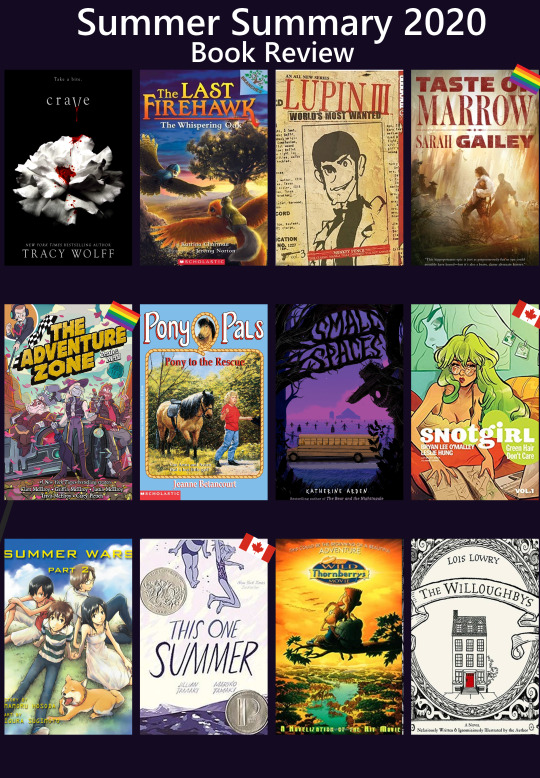
I didn’t get around to doing an individual post for the books I read in June/July/August, so I decided to choose a dozen that I read over the summer... I’d separate the wheat from the chaff for you so to speak. Though like you’re about to find out, that doesn’t necessarily mean they were all good by any means...
Crave
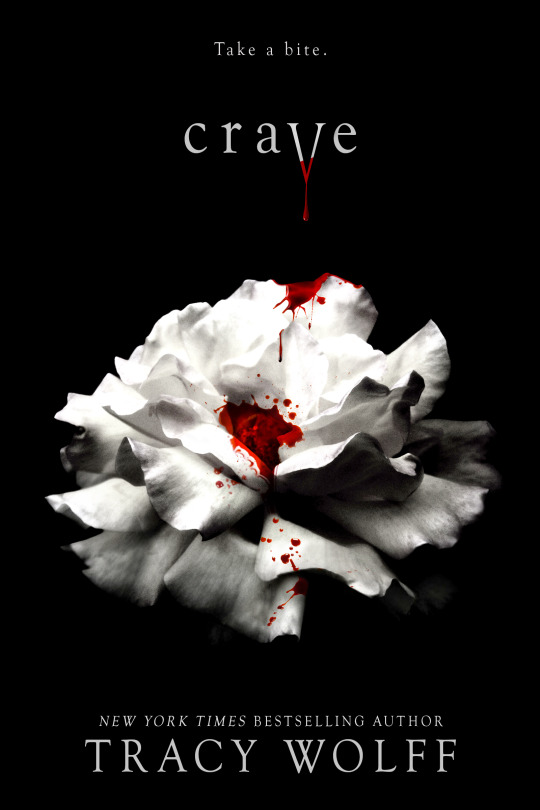
My girlfriend got this for me to “tide me over until Midnight Sun”. Between you and me, I think she was taking the piss. Anyway, Crave is very... standard fare paranormal YA school romance with the added flare of being written by an adult erotica writer, meaning the rhythm and tone of this novel is fucking bonkers. If you want to read the novel without reading the novel, just take Twilight and the entire Vampire Academy series, shove them in a blend, and force down the sludge you get from that. Normal Average Girl Goes To Secret School In Alaska For Vampire, Werewolves and Dragons. That’s this book. It is so big and so so so bad. I finished it out of spite, please don’t do that to yourself. Unless you are really craving (hurr hurr) some top tier trashy paranormal romance, in which case... no judgment.
The Last Firehawk

The Last Firehawk is a Scholastic “Branches” series, written for beginning readers (grade 1-3ish, depending on the child’s reading level). It has short stories, big text, and awesome pictures on every page. Guys. I unironically am adoring this series. It’s simple and is introducing children to a number of classic elements in the fantasy quest genre, but it is so charming. Friends Tag and Skyla discover a firehawk egg, and species that is supposed to have disappeared long ago. When Blaze hatches from it, the three are tasked with going out and finding the magical ember stone which was hidden long ago by the firehawks and which could be used to defeat the evil vulture Thorn and his dark magic... I read the first two books to second graders who ate it up and read the next four books because I personally wanted to continue the series. If you have young readers in your life (or just want a fun kid adventure) then please try these they’re the literary equivalent of nibbling on a chocolate chip cookie.
Lupin III: World’s Most Wanted #3
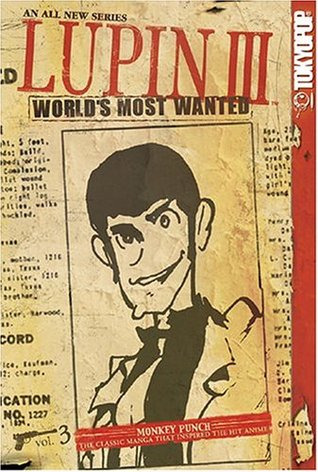
All the kind people that still follow my tumblr and haven’t tried to murder me because of my Lupin obsession are not going to be surprised by this one. I finally read one of the manga for this series and honestly I’m delighted. Somehow even hornier than the show, but hilariously funny. I felt like I was reading a more adult version of Spy Vs Spy. It’s a bunch of short, individual bits/adventures with lots of visual gags and an artstyle that is really different and delightful.
River of Teeth / Taste of Marrow (American Hippo series)
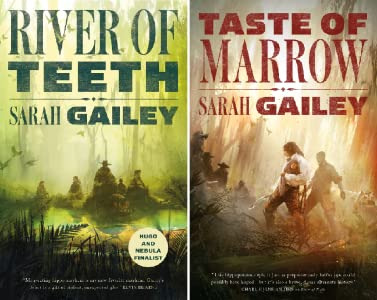
I’ve talked about River of Teeth before, but I finally finished the American Hippo duology and need to sing its praise. This is an alternate history series composed of two novellas that explore the question What would have happened if the States had decided to import hippos as livestock...? Anyways, my pitch for you: queer hippo cowboys. That’s all it took for me to read it. You have a gay gunslinger who loves his hippo to death, a nonbinary explosives-expert / poisoner who is the main love interest, a fat con artist who spoils her hippo and is the only voice of reason in this entire series, and a latina mother-to-be who is the scariest assassin in the entire series and is obviously scheming. The four of them are brought together on a job to deal with the Mississippi’s feral hippo problem.
IT’S A QUEER HIPPO COWBOY HEIST NOVEL GUYS I DON’T KNOW WHY I’M STILL TALKING AND YOU HAVEN’T JUST GONE TO READ THIS YET.
Petals to the Metal (The Adventure Zone series)
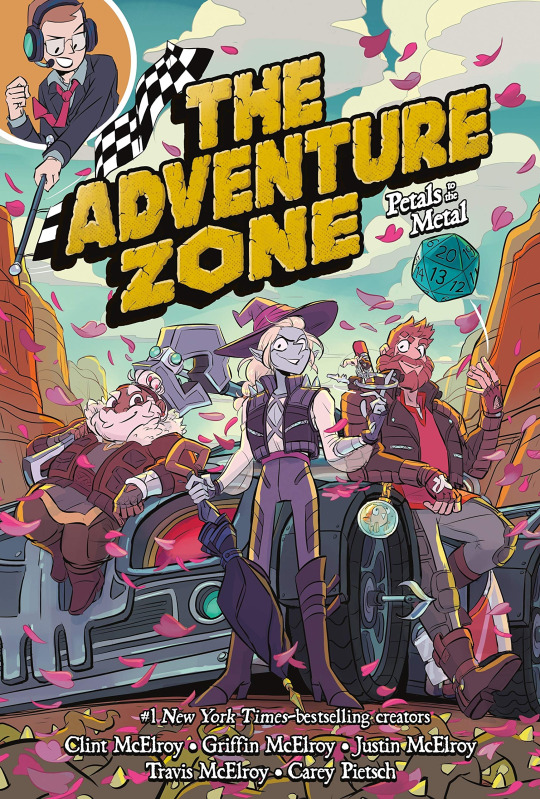
The graphic novel adaptation to the McElroy family’s DND podcast The Adventure Zone. Most of you are probably aware of this? It’s a great adaptation, it hits all the important beats, shows off the characters really well, and still gets lots of good gags in even while condensing entire arcs into single book stories. This one is probably my favourite so far just because Petals to the Metal was one of my favourite arcs in the show... but you can also see how the art has improved and the chaos of the race is fun to see drawn out.
If you like The Adventure Zone but haven’t tried the graphic novels yet -- would recommend! If you’ve always wanted to listen to The Adventure Zone but don’t have time for such a long series or struggle to focus on podcasts then pick up the first book of this series (Here There Be Gerblins) and try reading it! It really is an enjoyable adaptation.
Pony to the Rescue (Pony Pals series)
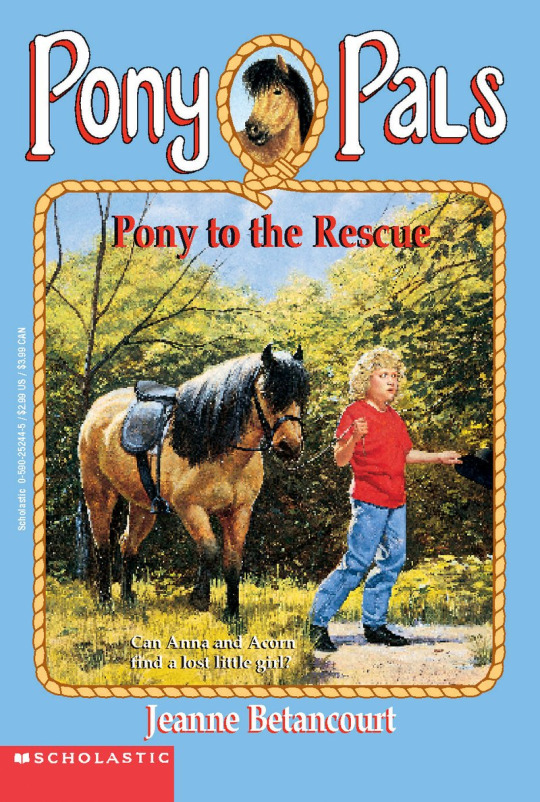
I continued my April/May theme of reading old-school chapter book series to combat Covid Brain Fry, so I picked up a few Pony Pals books. I read these as a kid and always enjoy them -- there’s just something so appealing to a child about having a horse. It gives your child characters a level of independence and ability to explore that you wouldn’t get otherwise. These books definitely read young, but they were nostalgic to revisit.
Small Spaces
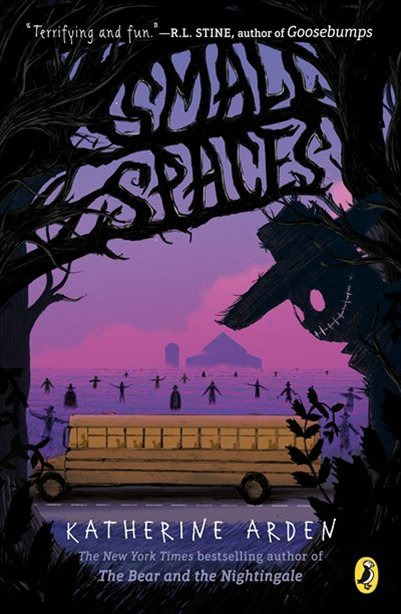
A really cool middle grade horror novel I picked up. Maybe it’s because I live around a lot of corn fields, but farm/scarecrow themed horror absolutely does it for me. One evening, after seeing a woman try to destroy a strange, old book, eleven year old Ollie doesn’t stop to think, instead stealing the book and running. That’s how she becomes wrapped up in the strange, sinister story of a cursed family and creature called the Smiling Man that seems to live out in the foggy fields. While unsettling, Ollie tries to remind herself that it’s just a story... but this becomes more challenging when her school bus breaks down one day out their own set of fields, and a fog is rolling in...
“Avoid large spaces. Stick to small.”
Snot Girl #1 - #2
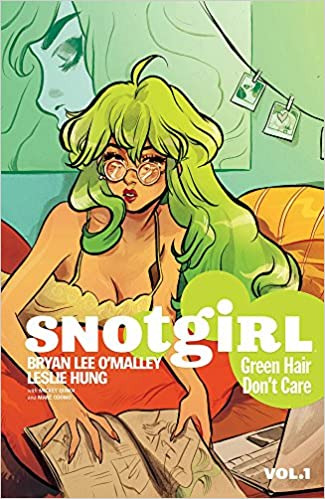
A Canadian graphic novel series by the creator of the Scott Pilgrim series! I love his work so I decided to give Snotgirl a try, even though it’s not generally my genre. I’m glad I did! First book took a while for me to get into, but by the time I hit the second I was really wrapped up in the mystery and character development. Snotgirl is about Lottie, a self-consumed fashion blogger whose biggest struggles are dealing with her allergies, frustration with her fellow-blogger friends, and how entirely her self-esteem is tied to her “beauty” and how people view her. But everything shifts in strange and horrifying ways when Lottie starts taking a new allergy medication, meets a new friend... and then witnesses that girl’s death. Or does she?
Seriously, or does she? I have no idea, I need to read the third book. This book is full of intrigue, complicated relationships, murder (or not?), and a healthy dose of magical realism to keep you guessing. If you like slice-of-life, crime, and abstract reality then this series is world a try. Plus the art is gorgeous.
Summer Wars #1 - #2
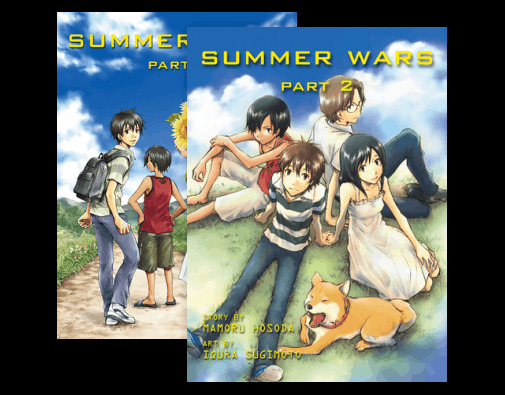
I recently rewatched Summer Wars (still one of my favourite movies) and decided to read the two-book manga adaptation. It was a really neat little adaptation. The creator of the movie gave the writer free range to tweak things to fit better in a manga format, which means some movie elements were allowed to fade into the background, whereas other aspects were fulled into the forefront and fleshed out to a greater degree. It was very cool, it kept the same story but gave you new things to think about which I wasn’t expecting. Reading this as a stand alone works just fine, but honestly if you’ve never watched the movie Summer Wars you should give it a try! It’s a great mix of slice-of-life, sprawling family dynamics that I relate to a little too well, cyber adventures, and fantasy. Super feel good.
This One Summer
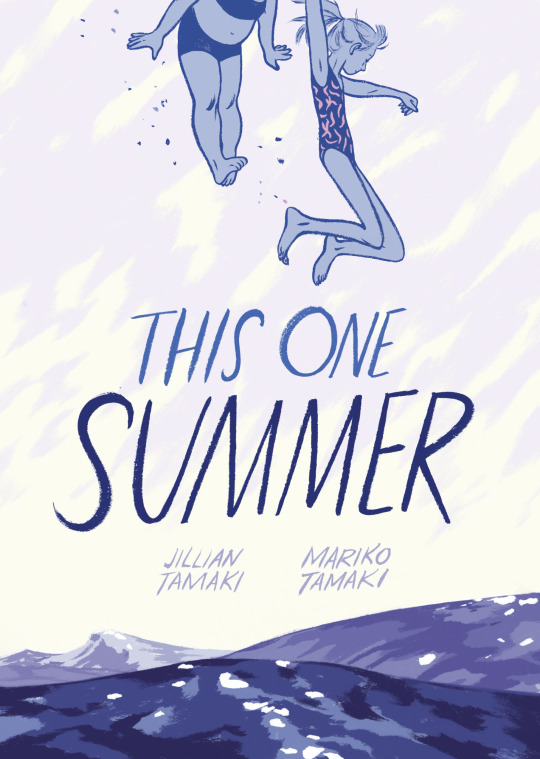
Okay, last graphic novel, I swear. This One Summer was... weird and intense. It’s a coming-of-age Canadian graphic novel that follows a pair of pre-teens who meet up like they do every year at their family’s summer cottages. You see them both in the awkward phases between childhood and growing up to become teenagers, as they’re confronted with things like maturity, friendship, self-esteem, family problems, and sexuality. A beautiful read, but probably the heaviest out of all the books on my list.
Wild Thornberrys Novelization
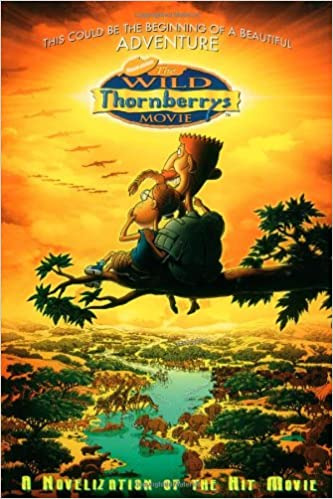
I rewatched The Wild Thornberrys movie with my girlfriend earlier this year, and decided I wanted to hunt down the chapter book novelization because I’m kind of a sucker for novelizations. Honestly, this was about what you would expect from the era. 90s/00s novelizations, especially young novelizations, are generally just a transcript of the movie without much thought or effort put into them to make them anything but. That’s what this was. It was fine, and it really let me revisualize the entire movie, but honestly you’re probably better off just rewatching the movie unless you also really deeply love The Wild Thornberrys.
The Willoughbys
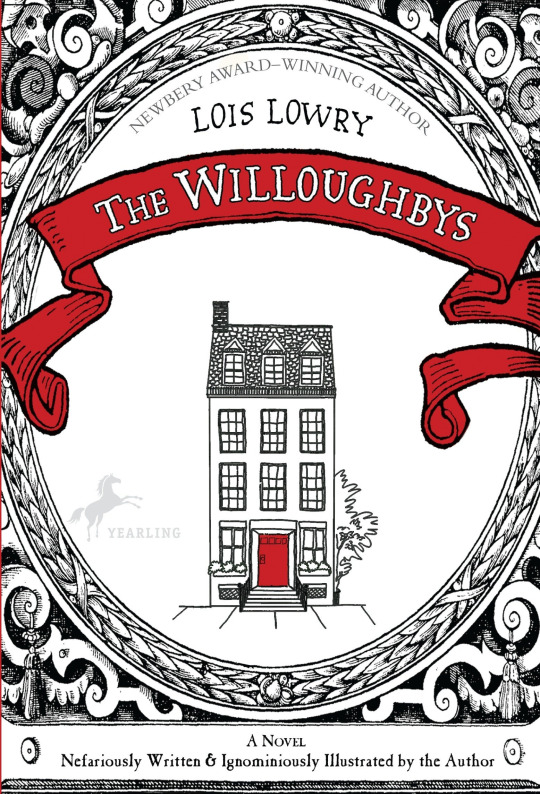
I saw that Netflix had done a funky looking adaptation of The Willoughbys and I decided I needed to read the book first before watching the movie. This was a little bizarre, I’m still not sure how I feel about it. Over all, I think it was a net-positive experience. It’s an obvious satire on classic children’s novels, especially the likes of Mary Poppins (real Mary Poppins, not the Disney version) and while a little heavy-handed, it does a Series of Unfortunate Events vibe that redeems it. The story is about a group of horrible children (The Ruthless Willoughbys) who decide they are sick of their parents and would rather become Worth Orphans... and to do that, they’re going to have to dispose of their inconvenient parents, obviously. Conveniently their parents are also sick of having children and decide to do away with them as well. The Willoughbys sets up three (or four?) different subplots that are gradually woven together through a series of schemes and exploits. It’s definitely more ruthless (hurr hurr) than the Netflix version, which tried to make the children more sympathetic, and in some ways I think that’s a definite point in the novel’s favour. I’m not sure I would go out of my way to recommend it, but it was a fun romp if you want something short and off the wall (and a lot more fleshed out than the Netflix version).
#book review#book reviews#the willoughbys#the wild thornberrys#lupin iii#scott pilgrim#snotgirl#bryan lee o'malley#this one summer#small spaces#pony pals#crave#the last firehawk#river of teeth#taste of marrow#american hippo#summer wars#petals to the metal#taz#novels#manga#graphic novels#children literature#kid lit#chatter
51 notes
·
View notes
Text
INTERVIEW: The Founder of an Anime and Manga Academic Journal Talks Anime Scholarship

Anime and manga have truly begun to enter the mainstream in recent years, with pop culture icons from Michael B. Jordan to Billie Eilish becoming vocal about their love of both. Even in academia, anime and manga are becoming recognized as legitimate art forms. We had the pleasure to talk with Billy Tringali, the Editor-in-Chief of the Journal of Anime and Manga Studies, a new academic publication focusing on... you guessed it, anime and manga! Tringali talks about how the journal was started, the history of anime academia in the West, and the love of the medium that lives at the core of this project.
Could you introduce yourself and give us a brief explanation of the Journal of Anime and Manga Studies?
Hello! I'm Billy Tringali. I have a Master's of Science in Library and Information Science from the University of Illinois at Urbana-Champaign's iSchool, and I'm the Editor-in-Chief of the Journal of Anime and Manga Studies. I'm currently the Outreach Librarian at Emory University School of Law, where I build resources, programming, and partnerships that help support student success. I'm a member of the Editorial Board for the Journal of International Women's Studies. I'm also a popular culture scholar, having presented at the Popular Culture Association's National Conference on topics ranging from building morality systems in vampiric video games to socio-cultural anxieties concerning gender and sexuality in Dracula. I am completely obsessed with anything created by Junji Ito. My favorite manga is a tossup between Death Note and A Silent Voice.
The Journal of Anime and Manga Studies is an open-access journal dedicated to providing an ethical, peer-reviewed space for academics, students, and independent researchers examining the field of anime, manga, cosplay, and fandom studies to share their research with others. JAMS is peer reviewed by scholars with experience in these areas. The goal of JAMS is to explore anime as an art form and bring visibility to the deeper meanings, understandings, and/or cultural significance of anime, manga, cosplay, and their fandoms.
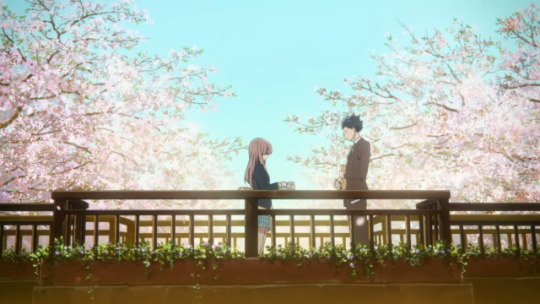
via Netflix
I understand that JAMS was born out of your desire to preserve and champion anime and manga. Could you tell us a bit about your personal experience with the media?
I love anime. I've been a fan of anime since I was a kid, but I didn't really start getting involved with anime and manga from a fandom perspective until high school. I founded my high school's anime club in 2009, and started attending and performing at anime conventions in New England in the same year. I started hosting anime con 'Cosplay Events' at 16, and have performed and hosted at conventions up and down the east coast. I eventually founded the Anime Boston "Cosplay Death Match" after hosting events there for several years. Highlights of managing that program included not being sure if I was getting prize support and running out to buy something to give to the winner (it was a toaster), and convincing my mother and grandmother to cosplay for the first time, throwing them into the event, and actually having my grandmother sweep the competition as Sophie from Howl's Moving Castle. (With my mom coming in second place as Cookin' Mama!) It lives forever on YouTube.
There is something so electric about anime conventions, about being around so many people so passionate about this medium, and being able to be on stage before so many of them was some of the most wonderful parts of my teens and early 20s. I have made some of my very closest friends because of anime, and owe some of my happiest experiences to my involvement with this medium and its fandoms. Then, in April of 2017, I was fortunate enough to visit the Kyoto International Manga Museum. Wandering the museum, surrounded by shelves upon shelves of manga, I came across a message from the museum’s Executive Director that put such a passion in me. I wanted to do something to contribute to this medium. I want scholarship about anime and manga to be accessible to everyone, regardless of university affiliation. JAMS is an action taken to help achieve this goal.
What work goes into launching an academic journal? Did you have to secure funding or institutional resources? How did you get the word out to potential contributors?
Bringing JAMS into existence was an incredibly exciting endeavor that took a lot of hard work. I started JAMS as part of my coursework for my master's degree. I partnered with the University Illinois at Urbana-Champaign's iSchool, the University Library's Office of Scholarly Communication and Publishing, and the Scholarly Commons to begin what would be a year-long notes process, during which I did research about open-access publishing and scholarly communication. Based on this research and the guidance of these offices I built the guidelines for publishing with JAMS. I had to prove there was an interest in this type of work being published and accessible, pointing to the journal Mechademia had been publishing work on anime since 2006, and the dozens of books about anime and manga have been written. But more than proving the idea of interest in anime and manga studies, I needed contributors. I needed to build an editorial board, reviewers, and potential authors. I wrote two conference papers and applied for (and received!) partial funding from the iSchool to present and attempt to pitch JAMS at two, national conferences on popular culture, the Midwest Popular Culture Association / American Culture Association's Conference and the Popular Culture Association's National Conference.
I made and purchased business cards for JAMS, handing them out at panels on anime and manga, pitching JAMS to a variety of scholars who reacted with everything from definite interest, to mild concern, to one scholar actively doubling over with laughter at the thought of open-access publishing and anime colliding. The most amazing moment was, after a panel, when a woman pulled me aside and was eagerly asking me questions about JAMS. She wanted to know about our guidelines, about how the process of approval was going at my university, and when I looked down at her nametag I realized it was Frenchy Lunning - the founder of Mechademia, the journal which had lent so much legitimacy to the idea of JAMS!
Meeting all these accomplished scholars and advertising JAMS at the PCA drummed up enough interest for a slot of peer reviewers and an editorial board. From there, after further evaluation of JAMS principles documentation, JAMS applied to be a part of the Illinois Open Publishing Network, and was successful. We put out our first call for papers not long after that, and published our first issue in October of 2020.
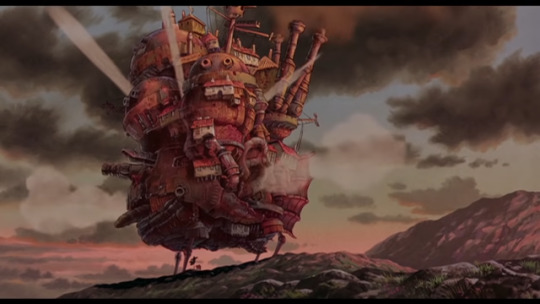
via HBO Max
JAMS is published through Illinois Open Publishing Network. Was accessibility a big concern for you when pursuing the creation of this journal?
Accessibility was my biggest concern when I was crafting JAMS. There was never a moment in time when I considered attempting to pursue the creation of this journal as anything other than open-access. I did my undergrad at a small state school in Massachusetts, and going from that to working as a graduate student in one of the largest academic libraries in the country was astounding. Millions of items at my fingertips that I never had access to before. Having so much access to so much amazing scholarship, I could only think of students at smaller universities, or fans outside of higher education that want to do this type of research. JAMS is open-access to be part of the solution to potential lack of access to scholarship about anime and manga.
Can you give us a general sense of the types of papers you've published and that you are hoping to receive?
JAMS publishes and is interested in high-quality work about anime, manga, cosplay, and their fandoms. We've had submissions, inquiries, and published works across a variety of disciplines. From analysis of the nuclear family structure in a major film, to the representation of the overlap in queer and disability cultures in a manga, to media industry history. Our Editorial Board members and reviewers come from backgrounds ranging from library and information science, to education, to literary studies. Anime and manga studies is a vast subject and extremely interdisciplinary, and because of that JAMS accepts papers from a variety of scholarly perspectives. What is the state of anime and manga academic study in the US? Has it gained more traction parallel to the growth of the industry in the past decade?
Anime and manga studies classes are being taught in universities across the United States. Dozens of articles are published every year that fall under anime and manga studies. People are crafting theses for their advanced degrees about anime, manga, cosplay, and their fandoms. It is an extremely exciting time for anime and manga studies in the United States.
Are anime and manga studies generally taken seriously by the rest of the academic world, or is this an area of study that is still broadly fighting for legitimacy?
I would say that any person who does academic work on popular culture has to deal with occasional comments about their research, and may need to battle harder to prove the legitimacy of their scholarship. But Shakespeare was once popular culture. And Paradise Lost is a fanfiction. Popular culture scholarship is scholarship.
Do you (or do you plan to) collaborate with any Japanese academic centers or scholars?
I would absolutely say that one of JAMS long-term goals would be to include more international scholars on our Editorial Board! Currently JAMS' only institutional connection is to the University of Illinois at Urbana-Champaign, but papers have been submitted and published by scholars in several countries. I hope that JAMS can continue to grow, and gain further connections as we do so.
Do you have anything you would like to say to students who want to pursue academic study of anime and manga (or just anime fans who are interested in this sort of work)?
This is the outreach librarian in me, but if you are a student at any level of education - your librarian is your best friend! Librarians are all trained to help you find the information you need. If you want to do research on anime and manga at your institution, they can help you understand what your university library has to offer, and what resources are right at your fingertips. You also don't need to be majoring in Asian Studies or Japanese to engage in anime and manga studies! You can approach fandom from a historical perspective, perform qualitative or quantitative data-based research on using manga in a classroom setting, the sky's the limit! Additionally, there are a number of amazing resource guides put together by librarians all across the internet that are worth digging into. Your local library may also have a connection to a local university, which might give you limited borrowing privileges. Even just doing close readings and analysis of anime can make for amazing presentations at conventions and online, which might help inspire the next person to engage with anime and manga studies.

via HBO Max
Go check out the exciting work being published in JAMS at their website, where you can also submit any of your own academic work for consideration!
You can read an introduction to the journal here.
You can follow Billy Tringali on Twitter @BillyTringali and the journal @OpenAccessAnime.
By: Cayla Coats
4 notes
·
View notes
Text
I’m going to say it: I didn’t like Little Women 2019
If you loved it, I’m thrilled for you and I’m going to ask you to just move along and not read this if me talking about why I may have actually hated it is going to upset you. And yeah, yeah, I know I’m in a very small minority here. Okay? Okay. Let’s go. Let’s start here, with this New Yorker review by Richard Brody. I read a ton of reviews of this film (which is how I know how alone I am in this) and this one was so interesting to me, and not just because it was one of the few pieces critical of the film, even though Brody largely approves in the end.
One of the interesting things about this review is how it defines the theme of the film:
"[Gerwig’s] version of “Little Women” is about a free-spirited young woman whose ambitions threaten to detach her from her financially struggling family, and who discovers that her intellectual self-fulfillment and emotional development are inseparable from her devotion to her family."
None of the other reviews I’ve read talk about the theme in these terms. They mention sisterhood, yes, which is different than family and fits better into a feminist narrative, which is the starting point for most other reviews. I read a lot of those reviews before seeing the movie and maybe because of that, I was expecting the film to be more of a loose adaptation tailored to more modern sensibilities of a 21st century audience and was surprised to find it that it didn’t step very far from the source material in feminist terms, not when you really looked at it. I was expecting something more radical. Maybe that’s my own fault. Anyway...
So reading Brody’s review after seeing the film cast it in a different light, but I'm still not sold that it was any more effective. Because the feminism thing is still there and viewed in a theme of family, it sits even more oddly on the story, like a veneer that doesn't cover the underlying base wood and so the two things fight each other. Or no, they ignore each other and the two concepts never connect. You get a scene of Jo wailing about women having minds and then a scene with Amy talking about marriage being an economic transaction and then Jo abandoning everything to run home and care for a dying sister, which doesn’t tie the two themes together or actually support either. Because what she abandoned was work that wasn't artistically fulfilling anyway, so where was the battle between art and family? It was an idea floating out there close enough for Brody to pick up on it but it was never employed to actually connect the pieces of the movie.
And in the end, it is the very devotion to family that leads Jo to her "true art." So again, there's a fight between what the director wants to say (if that is what she wants to say) and how it doesn't really fit over the base she wants to laminate it over.
This is interesting too, this take down of Saoirse Ronan's performance in Brody’s review: "[Jo,] famous for her anger, for her “temper,” comes off as unduly moderate, both inwardly and outwardly—not in conflict with herself, not repressing that rage, but merely claiming one that’s hardly in danger of bursting forth."
I didn't love Ronan as Jo but I think this is really harsh and, in fact, for me this is a better description of the entire film. Unduly moderate sums it up beautifully. If Ronan's Jo couldn't break out, it's because of the stricture of the film itself.
(We’re about to talk of Bhaer, and as a side note, this drives me insane: "Friedrich Bhaer, a German philosopher played by the French actor Louis Garrel..." It’s 2019/20 and we're still patronizing American audiences by believing they'll accept any European playing any other European because we're too stupid to know any better. But this American found Louis Garrel so Gallic, so very not German, it was terribly distracting.)
Anyway, I wonder if this is one of those stories where people have their own versions of it and can't help but bring that to a viewing of every adaptation because look at what Brody says here about Bhaer: "[Bhaer] provides the hinge that brings the two parts of [Jo’s] drive together. As in the novel, the philosopher looks with dismay at the lurid romances that Jo writes and sells. In Gerwig’s movie, he encourages her to write from life, to write her experiences realistically and sincerely."
But no he doesn't! Not in this version. He does in the book and in every other version, but here all he does is tell Jo that her stories aren't good because they're badly written. Yeah, the topics aren't great but he mostly talks about the writing and how even Shakespeare brought poetry to works he wrote for the hoi polloi.
In the book, he doesn't frame it that way. He thinks her writing is good but her choice of sensational topics is beneath her (even though it's the thing that's making her money.) And in the book--and all the other adaptations--it is he who urges her to the old "write what you know" crap.
But in this version, we can't have a man tell Jo what to do, so Gerwig gives that to Beth. In the book, Jo stays in New York and tries to do what Bhaer suggested but fails, returns to Concord, and it’s her mother and father who urge her to write without really telling her what to write, after Beth dies. But in this version, Jo returns to Concord in defeat, it's Beth who gets her to write again by asking her to write stories like she did when they were kids, blah blah. And then Beth dies and Jo finds solace in those stories, puts them together in a book and sends them off to the publisher with the most ridiculous query letter ever written in the history of publishing.
So anyway, this all goes back to the supposed theme of art vs the demands of family because in Gerwig’s version even moreso than the book, it was family that gave Jo's art what it needed. So....what's the problem? If "the demands of family are at war with art" is the message you wanted to send, Little Women was maybe not the best vehicle for it, not if you are not going to hew farther away from the source.
And then this: “The spectre that hangs over Jo’s literary ambition is bohemianism—the rejection of the settled domestic life and its morality in favor of being independent and unmoored, freethinking, and, above all, poor. “
Again, that doesn't square with the feminist themes and all of the talk about marriage being an economic contract because Jo marrying or not marrying Bhaer still ends up with no huge economic impact because for all of the things it changes or dispenses with, this version holds onto Jo inheriting Aunt March's mansion. So now that Jo is a successful novelist and property holder, choosing to marry Bhaer or not is really free of negative practical considerations for Jo and so WHY NOW IS IT A PROBLEM??? He loves her. He supports her work. He's hot. She has a nice house and some dough, so the spectre of Bohemian penury is banished. It's pretty damned ideal and there is no struggle here!
This is where it feels like the movie trips over a kind of entry-level feminism. "Jo/Katniss/Any Female Lead doesn't need a man!" Okay, yes, that's already established. But...can she want one? They can be nice to have around.
In the middle of the movie, Jo has that cri de coeur that's in all the trailers, where she wails about how "Women have minds and they have souls as well as hearts, etc." But then she finishes up, sobbing into her hands "But I'm so lonely!" And that's how the "Katniss doesn't need a man!" conundrum tangles women up. I searched that "Women have minds!" quote on twitter and there are hundreds of tweets of women quoting it and saying "I felt that in my gut!"
And yet here is this movie that does that, that stabs women in the gut with that speech, and then instead of showing Jo figuring out how to live happily as a woman alone, it provides her with everything she needs to be an independent artist woman with a mind AND have her cake and eat it too with hottie sweetheart Bhaer (who is much more of a hot sweetheart here than in the book) and then just lets it dangle there, like bait on the hook, daring you to want it by literally telling you that you are a traitor to the cause if you do. That wasn't brilliant. It's either mean-spirited or cowardly. I'm not sure which.
I have lots of other quibbles (Mr. March being reduced to a feckless buffoon, the sop to acknowledging racism and then swiftly moving on, nobody’s clothes fitting properly, the hair, dear God, the hair) but it’s that ending with it’s sneering little trap set for the audience that made me feel this film was not a radical rethinking of a classic but the finding of a different kind of moral within it, which came across as moralizing all the same.
10 notes
·
View notes
Photo
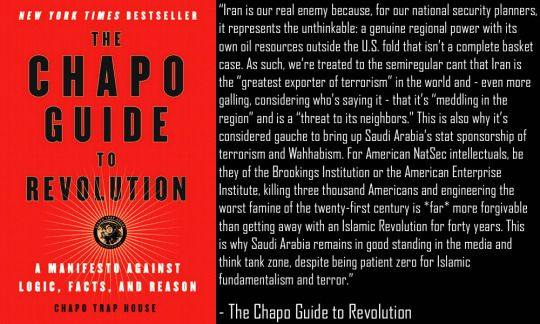
Editor's note: while I've certainly been away from Can't You Read for quite a while, anyone who follows my work at ninaillingworth.com or my Patreon blog already knows that I've been writing (and podcasting) again. You can check out some of my latest essays here, here and here; to listen to the podcast I co-host with Nick Galea (No Fugazi) just click here.
Today however I'm back on my bookworm bullsh*t with another curiously dated review of left wing literature from my extensive library of pinko pontification. In today's review, we're going to be taking a look at “The Chapo Guide to Revolution: a Manifesto Against Logic, Facts and Reason” written by five members of the popular left wing podcast “Chapo Trap House” - specifically, Felix Beiderman, Matt Christman, Brendan James, Will Menaker and Virgil Texas.
Baby Steps up the Ramparts
It is I will theorize, utterly impossible to write a review about the Chapo Trap House book without engaging in the extremely online, three-sided culture war that has sprung up around both “the Chapos” themselves and the enormously popular podcast they host. In light of the fact that seemingly everyone on the internet who detests the show regard the Chapos as slovenly crackpot losers born on third base and podcasting from mom's basement, it really is alarming how much digital ink has been spilled about the various types of “threat” to all that is good and holy this simple irony-infused podcast supposedly represents. While I intend to largely sidestep that discussion by focusing entirely on the book and not the podcast (which I don't listen to regularly, to be honest with you), I accept that virtually nobody reading this is going to be happy unless I do something to address the elephant in the room, so here goes:
Neera Tanden and her winged neoliberal monkeys can eat sh*t, but extremely online leftists have a point that the Chapos themselves occasionally skirt the line between mockingly ironic reactionary thought and just plain old reactionary thought; although this is not particularly alarming to me because they're Americans and America itself is a breeding ground for reactionary ideas – decolonizing your mind is a process and I'm pretty sure it's one I myself am also engaging in still every single day of my life at this point. Importantly, in my opinion this failing does not make them cryptofascists so much as the product of American affluence; I'm having a hard time understanding how teaching Marx and Zinn to Twitter reply guys serves the fascist agenda in any meaningful way. While I obviously can't pretend to know another person's heart, in my opinion the Chapo boys are definitely leftists but they're obviously not labor class and yes it's a little hard to explain away the group's loose affiliation with the (objectively strasserist) Red Scare podcast through co-host Amber A'Lee Frost - but I'm not going to waste a couple thousand words trying to untangle Brooklyn independent media drama from half a country away and besides, Amber didn’t write this book. Despite these critiques however, I think it's important to note that under no circumstances am I prepared to accept the argument that with fascists to the right of me, and lanyards, um also to the right, the real problem here is... Chapo Trap House.
Ok, with that out of the way let's dive right in and talk about the question I think most folks who've written about The Chapo Guide to Revolution have largely failed to grasp – namely, what kind of book is it precisely? Combining elements of comedy, playful online trolling, historical analysis, political theory and good old-fashioned cross platform promotional marketing, the book has often lead critics to compare it to catch-all comedic efforts like Joe Stewart's “America” or even humorous men’s lifestyle advice texts like “Max Headroom's Guide to Life.” This is I think an essential misreading of the fundamentally earnest and direct tone the book actually takes in its efforts to reach a fledgling audience growing more receptive to left wing ideas. The Chapo Guide to Revolution is, as the cover says, a manifesto; but rather than serving as the mission statement for a particular formed political ideology, the Chapos have written an extremely effective, entry-level argument for why labor-class millennials should be leftists – and, of course, why they should listen to Chapo Trap House; this is still a cross-promotional work after all.
Naturally as befits a book about a comedy podcast, albeit a very political one, the Chapo Guide to Revolution is an extremely funny book that does a remarkable job translating the type of caustic online humor previously only found in left wing Twitter circles, onto the written page. While its certainly true that this quirky style of comedy can be a little difficult to grasp for the uninitiated, and typically a cross-promotional work of this type will get bogged down in self-referential humor and inside jokes, the book mostly avoids this trap by sticking with the basics and assuming that the reader has literally never heard an episode of Chapo Trap House, which in turn makes the humor fairly universal and extremely accessible – at least for anyone under the age of fifty. This endeavor is greatly aided by the dark and dystopian, yet hilariously eviscerating art of Eli Valley; a man who himself has since become one of the leading left wing critics of establishment power online through his extremely provocative sketches and ink work.
The truth however is that if the Chapo Guide to Revolution was merely just a funny book, I wouldn't be reviewing it here today. No, the reason this book is worth writing about at all lies in the fact that underneath all the jokes, taunts and “half-baked Marxism” lies an objectively brilliant work of historical analysis, cultural critique and left wing political theory – albeit an unfocused theory that borrows heavily from half a dozen functionally incompatible left wing thinkers and literary giants, but a fundamentally serious work of political philosophy nonetheless.
Yes, that's correct; I said brilliant. Where think-tank minions and neoliberal swine in the corporate media see a petulant pinko tantrum, and online leftist academics see privileged dudebros appropriating Marx (poorly), I see a brilliant and yet stealthy synthesis of political theories, historical analysis and organizational ideas originally presented by writers like Howard Zinn, Noam Chomsky and Thomas Frank. Drawing on historical theories from Marx, Gramsci and Rocker, the Chapos have cobbled together a rudimentary political philosophy that represents a crude and yet promising welding of anarchist concepts about labor, Marxist concepts about economics and democratic socialist concepts about politics, collected together under the generic banner of “socialism.”
At this point some of you are undoubtedly snickering, but please bear with me for a moment here because what the Chapos (or their ghostwriter) have done in this book is truly a marvelous thing to behold precisely because you can't see it unless you're paying close attention. By positioning The Chapo Guide to Revolution as both a comedic work and an introductory level text, the authors have created a sort of unique crash course in left wing history, geopolitics, philosophy and political theory for a newly awakened generation of Americans who find themselves increasingly politicized whether they like it or not.
Underneath the acerbic millennial humor, “extremely online” diction and unrelenting waves of sarcasm, The Chapo Guide to Revolution is also a surprisingly accurate “CliffsNotes” style textbook presentation of multiple broad-based social science subjects – here are just a few examples:
In “Chapter One: World” the book presents a rudimentary and yet deliciously insightful history of post-World War II American empire that draws on authors like Howard Zinn and Noam Chomsky, with a touch of contemporary writers like Greg Grandin and Naomi Klein. In particular the attention devoted to condensing the target audience's formative experiences with empire like the War on Terror, the invasion of Iraq and the war in Afghanistan, into a short and coherent narrative that can be easily shared with other novice political observers makes this book an invaluable resource for budding millennial leftists Additionally, while it certainly might have been an accident, the Chapos' choice to wrap this “Pig Empire geopolitics for newbs” lesson in a protracted joke about America as an extremely ruthless corporate startup at least touches on ideas presented by writers like Roxanne Dunbar-Ortiz, Sheldon Wollin (or Chris Hedges repeating Sheldon Wolin), Joel Bakan, Rosa Luxemburg and others.
In Chapters Two and Three, entitled “Libs” and “Cons” respectively, the authors conduct a remarkably thorough political science lesson on the two major mainstream political “ideologies” in American culture, including both a rough outline of their history and their modern calcification inside the Democratic and Republican parties. Of course both of these sections rely heavily on the personal experiences of the authors growing up in a politicized America, but these discussions also dip into the works of Thomas Frank and Cory Robin to explore and critique the liberal and conservative political mindset respectively; in particular the Chapos summary of Robin's work on the conservative worship of hierarchies is an inspired distillation. More importantly however, the Chapos also expose the way in which these two ideologies represent a false dichotomy within the greater confines of a larger capitalist socioeconomic order; which is of course a (still absolutely correct) idea straight out of the works of Karl Marx.
In Chapter Six, appropriately entitled “work” the authors engaged in a disarmingly earnest discussion about wage slavery, the false promises of the protestant work ethic and the history of terrible jobs available to the labor class under various iterations of the capitalist project. This is followed by a humorous, but dystopian review of what future jobs might look like if the neoliberal socioeconomic order continues on as it has so far, and an extremely brief but sincerely argued pitch for completely transforming the role of work in society through some from of technologically assisted anarcho-communism. This last idea is admittedly a little half-baked but you have to admire their balls when the Chapo boys flatly call for a three hour workday; a position that will undoubtedly be popular with the labor class who're currently engaged in all those sh*tty jobs the book describes earlier in the chapter. Once again this synthesis of left wing ideas about work does represent a new and unique formulation, but despite the humorous and original content you can also clearly see the influence of anarchist writers like Kropotkin, Rocker and Goldman in this chapter, as well as contemporary authors like David Graeber and Mark Blyth.
Unfortunately, if there is a downside to writing a brilliantly subversive comedy book that functions as a “my little lefty politics primer” for politically awakening millennials, it's that you simply don't have the space for an intellectually rigorous examination of all the ideas you're sharing – there is after all a big difference between reading the Cliff Notes version of Zinn, Chomsky or Marx, and reading the original theories in their full form. Furthermore, the individual life experiences, idiosyncrasies and humor styles of the authors do at times bleed into the text in a way that I personally suspect was detrimental to the overall analysis. Here's a short list of “sour notes” I found in this otherwise remarkable book:
From what I have listened to of the Chapo Trap House podcast, it has always been my impression that the Chapos were particularly effective critics of American corporate media, so I was a little disappointed that the chapter on media in The Chapo Guide to Revolution was a fairly tepid and narrow discussion about (admittedly vapid) bloggers turned celebrated pundits. Don't get me wrong, I'm sure power dunking on the likes of Matty Yglesias, Meagan McArdell and Andrew Sullivan was viscerally satisfying for the book's target audience, but there's really not much of a broader critique of the media's ideological role in American capitalism and culture here like one would find in Herman & Chomsky's “Manufacturing Consent”, Matt Taibbi's “Hate Inc” or Michael Parenti's “Inventing Reality.” This absence I fear has the tragic side effect of reinforcing the idea the American corporate media sucks because egg-shaped moron bougie pundits are bad at their job and not because of the inherent failings of the for-profit media model and the institution's true role as an ideological shepherd keeping the masses aligned with the goals of elite capital and the ruling classes – almost exclusively against the bests interests of the labor class.
The introduction is written in what I can only assume is a sarcastic imitation of right-leaning self improvement books with a touch of Tyler Durden's Fight Club ethos thrown in; this might have been a better choice in a completely different book but it's largely out of place with the rest of this book. At this point I should also say that the best part about the Kidzone intermission is that it was only two pages long. Needless to say, neither one of these sections did anything for me whatsoever.
While it's entirely possible that at forty-three years of age, I'm simply too old to really get the “millenialness” of the chapter on Culture, the simple truth is that I found most of it to be a fairly useless examination of pop culture influences the Chapos hold in reasonably high esteem. As someone who isn't particularly engaged in watching lengthy television series or regularly playing video games, I really couldn't dig into most of the material presented and the less said about the art jokes and the bizarre absurdist discussion of elevator brands, the better. There is however one rather notable exception here in the brief essay on The Sorkin Mindset, which is an objectively brilliant evisceration of the liberal obsession with the West Wing and the tragic effect that obsession has had on Democratic Party politics – this really could have gone in the chapter on “Libs” because it's that valuable of a tool for understanding and critiquing the modern liberal lanyard worldview. Finally I guess I should note that while the Chapo boys' insightful critique of the vapid “prestige TV” phenomenon is both interesting and correct, it really only “matters” if you're a consumer of these types of series – and I'm not.
While I certainly understand the authors' decision to use their notes section to preemptively debunk bullsh*t complaints about the more outrageous accusations they level against the American establishment, I would have liked to see a “recommended reading” section. It is very clear that the Chapos have a reasonably strong background in imperial history, political science and labor theory and I feel like pointing readers towards writers who expand on the theories they summarize in The Chapo Guide to Revolution might have been a better use of space than printing links to old internet articles bad faith actors will never type into a search engine anyway.
Although it might seem like there was more about the book I didn't like, than I did, this is a little misleading – the first three chapters of The Chapo Guide to Revolution are pure fire and comprise over half of the volume. If you throw in the brilliant chapter about work and labor theory, the overall package is far more substance than style, despite the fact that it remains humorous and a little bit edgy throughout the book. While it's certainly fair to say that an introductory primer on why you should be a leftist for newly-politicized millennials isn't a must-read for everyone, the simple truth is that the vast majority of online leftists I know could learn a thing or two from this rudimentary synthesis of various left wing ideas into the seeds of a working, modern political ideology compatible with a uniquely Americanized, millennial left.
While no three hundred page comedy book written by five podcasters from Brooklyn is going to teach you everything there is to know about socialism and left wing ideology, there's something to be said for offering an accessible, entry-level alternative tailor-made for a target demographic already being heavily recruited by the fascists. As a starting point for exploring left wing political thought, you could do a lot worse than The Chapo Guide to Revolution and for a generation of kids who've mostly been encouraged to be passive accomplices to their own subjugation while blaming their misery on anyone even more powerless than they are, there is perhaps nothing more valuable than a condensed narrative that explores how to even think about another way to live.
Remarkably, this book finds a way to deliver on that monumental task while simultaneously failing to grasp one single relevant thing about the cherished American novel Moby Dick. Despite this infuriating literary myopia and insolence, this still might literally be the best book ever written for young American leftists who simply aren't going to spend ten years reading academic literature written by dead white guys from Germany and Russia. - nina illingworth Independent writer, critic and analyst with a left focus. Please help me fight corporate censorship by sharing my articles with your friends online! You can find my work at ninaillingworth.com, Can’t You Read, Media Madness and my Patreon Blog Updates available on Twitter, Mastodon and Facebook. Podcast at “No Fugazi” on Soundcloud. Chat with fellow readers online at Anarcho Nina Writes on Discord!
#chapo trap house#book review#The Chapo Guide to Revolution#left wing politics#geopolitics#humor#leftism#introduction to leftism#Noam Chomsky#Howard Zinn#Thomas Frank#Cory Robin#culture war#politics#news#media#bloggers#savage burns
3 notes
·
View notes
Text
Aussie Luke sails into crusade against hunger

AFTER his stint in South Sudan visiting starving mothers and children, Australian actor Luke Arnold is back in South Africa this week on a very different mission — to start the third season of the runaway hit pirate series,
Arnold, a rising star on our screens who memorably played the late INXS singer Michael Hutchence in the TV miniseries has been living a whirlwind life since he was picked up as a relative unknown for the US.
TV series. He mixes work as a goodwill ambassador for Save the Children with acting in the grimy prequel to Robert Louis Stevenson’s literary classic
The series follows the exploits of pirate Captain Flint and his crew and Arnold has the plum role of Long John Silver.
“I get to play the original story of Long John Silver and we get to have our version of who that might be,” says Arnold, who trained at the Western Australian Academy of Performing Arts in Perth but grew up in Adelaide where he attended Aldgate Primary School.
It has lighthearted moments but the series is a characterdriven drama filled with liars, murderers and thieves, among them a young Long John. With more than five million Americans watching each episode, Arnold is getting his wish to allow Long John’s story to slowly build.
“When I signed on for this role it only felt worth it if we went for a few years and I got to turn this character, who is a chancer and almost a street rat, into one of the most notorious pirates of literature,” he says.
“So for me, I definitely want a few more years to complete that journey.”
Arnold was in Cape Town making the second series when his eerily convincing portrayal of the late Michael Hutchence screened in Australia earlier this year. The surviving members of INXS were on set during the shoot to support Arnold in what he says was the biggest gamble of his career.

For the month before it went to air, the pressure was so great he barely slept. Until then he had flown under the radar with smaller independent films like and
which came with their own safety nets. “If it wasn’t any good, no one would see it,” he says. “It’s OK if it’s good but if it’s not it will disappear. But with a show like this you knew people were going to watch.”
As it turned out, Arnold got rave reviews for a breakthrough role that made him a virtual overnight sensation. His malleable good looks fitted the rock star mould just as easily as they do a long- haired, treasure hungry pirate.
“While it was airing I was in Cape Town, which I think was kind of nice to not be here when it was going crazy,” he says. “Then I wasn’t sure what it was going to be like coming back.”
Since returning home he has been recognised at times but, he says, always in a positive way. People were touched by the show and wanted to pass on their appreciation.
“It’s actually been a pleasurable thing,” he says. “It’s a good reminder to do jobs that you believe in and you love. I’m sure being in the public eye is not always going to be fun but when it’s because of a show like it has been a really fun experience.”
After finishing season 2 last May, Arnold did some private travel in Europe and the US, stopping in Los Angeles to discuss work for next year. He can’t reveal anything but hopes for a new project after the third season of finishes filming in May 2015.

“There’s nothing I can speak of yet. It’s a little too soon to lock anything in but it feels like because of the success of both the shows some doors are opening that weren’t open before,” he says.
His took on the role of goodwill ambassador because he felt he could use his profile to spread a valuable message about what Save the Children was doing in a more obscure part of the world. He says South Sudan has been torn apart by tribal conflict since December last year. Supply routes are cut and people have fled their homes, creating a food shortage of serious proportions. He spent time at a hospital that runs a program to combat malnutrition using a highly nutritious peanut paste.
“That’s where I spent the majority of the trip, talking to staff as well as mothers and children,” he says. “Several mothers had got to the point of boiling grasses and leaves because they had nothing to eat. Obviously it isn’t enough.”
He says he feels a responsibility to do what he can to help.
15 notes
·
View notes
Text
Wellesley Writes It: Interview with Patrice Caldwell ’15, Founder of People of Color in Publishing
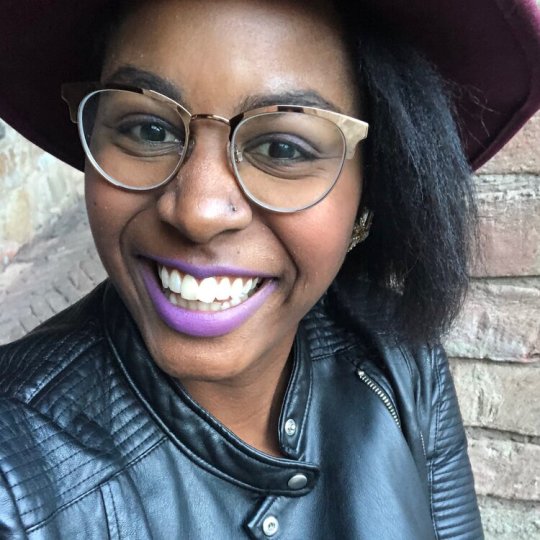
Patrice Caldwell ’15 is the founder & fundraising chair of People of Color in Publishing – a grassroots organization dedicated to supporting, empowering, and uplifting racially and ethnically marginalized members of the book publishing industry. Born and raised in Texas, Patrice was a children’s book editor before shifting to be a literary agent at Howard Morhaim Literary Agency.
In 2018, she was named a Publishers Weekly Star Watch honoree and featured on The Writer’s Digest podcast and Bustle’s inaugural “Lit List” as one of ten women changing the book world.
Her anthology, A Phoenix First Must Burn – 16 stories of Black girl magic, resistance, and hope – is out March 10, 2020 from Viking Books for Young Readers/Penguin Teen in the US/Canada and Hot Key Books in the UK! Visit Patrice online at patricecaldwell.com, Twitter @whimsicallyours, and Instagram @whimsicalaquarian.
Wellesley Underground’s Wellesley Writes it Series Editor, E.B. Bartels ’10, had the chance to converse with Patrice via email about publishing, reading, and writing. E.B. is grateful to Patrice for willing to be part of the Wellesley Writes It series, even with everything else she has going on!
EB: When did you first become interested in going into writing and publishing? Did something at Wellesley spark that interest?
PC: For as long as I can remember, I’ve loved writing. It’s how I best express myself. That love pretty naturally grew into creating stories. I’ve always had a very vivid imagination. I’ve also always been pretty aware that publishers exist. I remember at a young age noticing the logos on the spines of books (notating the imprint/publisher), so by the time I was a teen I could recall which publishers published my favorite books (served me very well in interviews, haha) and was curious about that process. But I was a theater kid, intensely, that’s what I thought I would do, but then I decided to go to Wellesley and majored in political science (especially theory—I took ever class Professor Grattan, she’s brilliant) but then dabbled in a bunch of other subjects, including English. I think English courses definitely strengthened my critical thinking, but I absolutely do not think you have to be an English or creative writing major in order to work in publishing or be a writer. My theater background is just as helpful as is my political theory one. (I have friends who are best-selling authors who did MFA programs and others who never went to college.)
Wellesley was my safe space. I came back to myself while at Wellesley. I wrote three (unpublished) manuscripts during my time there, starting the summer after my first year, and I held publishing and writing related internships. I also took a fantastic children’s literature course taught by Susan Meyer (who’s a children’s author herself!) that changed my world. I highly recommend it. We studied children’s literature, got to talk to an author and a literary agent, and we wrote our own stories. I later did a creative writing independent study with her, and I truly thank Professor Meyer for expanding my interest in writing and publishing.
EB: How did People in Color Publishing come about? What goals do you have for the organization? What would you like people to know about it?
PC: I founded People of Color in Publishing in August 2016 to allow people of color clearer access into the book publishing industry, better support networks, and professional development opportunities. It really is about sending the elevator back down for others after climbing (& maybe even assembling) the stairs.
We’re currently working towards nonprofit status. You can learn more about us and our initiatives at https://www.pocinpublishing.com/ and sign up for our newsletter, which is incredibly well done. As you’ll see when you visit the site, the organization really is a team effort. I don’t and couldn’t do this alone; I’ve had an amazing team with me from day one. We each play to our strengths and work really well together. (The org is very active on Instagram and Twitter, too!)
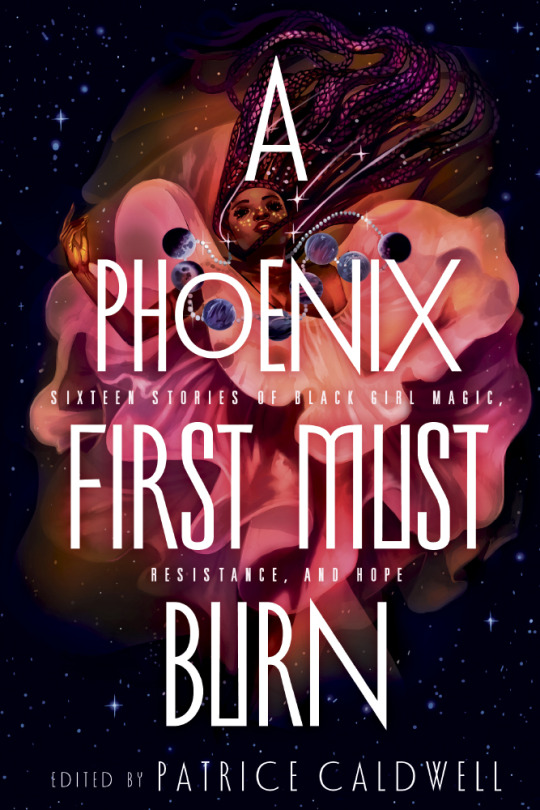
EB: I am really excited about your collection A Phoenix First Must Burn, coming out from Penguin Random House on March 10, 2020. What inspired you to put together that anthology? What was challenging about the process of compiling the anthology, and what was rewarding about it?
PC: Thank you; I’m so excited for it as well. I talk about this more in the book’s introduction, but I was inspired by my eternal love for Octavia Butler—the title even comes from a passage in Parable of the Talents—as well as similar adult market anthologies like Sheree R. Thomas’s Dark Matter, and wondering what one for teens would look like. The answer is power and imagination like I’ve never before seen, in the form of a kick-ass, #BlackGirlMagic anthology that’s hella queer—I love it and wouldn’t have it any other way.
Before I became a literary agent, I was a children’s book editor. The editing of these stories was the easy part. It was super fun. The hard part was wrangling of everyone, haha. Thankfully they were amazing to work with and I wasn’t doing it alone—my then editor Kendra Levin also has a fantastic editorial eye.
As for what was rewarding, my younger self needed this. Like I said, it’s Black and queer. Since Toni Morrison passed, a day hasn’t gone by in which I’ve thought, about how she wrote for Black people, especially Black women, unapologetically. I feel that deeply. I got to work with some of my favorite writers writing today. How often does someone get to say that, you know. And, I grew a lot as a writer. I never thought I could write a short story, but I did. We’ve been getting some really great early reviews (like this beautifully-written starred review from Kirkus, OMG!) But going back to how my younger self needed this, the most rewarding thing has been the people who’ve reached out how excited they are to read it and how much they’ve been craving a book like this. It’s a dream come true. A dream I strategized to reach, worked my butt off on, and so yeah, I’m over the moon.
EB: You're also the author of a YA fantasy book (publication date TBD) in addition to the anthology. How is the experience of writing a fantasy novel different and/or similar to compiling an anthology? What advice would you give to someone writing their own book (of any genre)?
PC: It’s such a different experience in that writing this novel is all me, especially because it hasn’t sold yet (I’m finishing revising it now). My agents are amazing, with an excellent editorial skills, and so they’re certainly there to help and advise me should I need them—and then I have author friends I can ask for advice too—but ultimately if I don’t write this book, it doesn’t get written. There’s no one else to nudge.
The similarities, however, between novels and short stories are that ultimately, I’m the same writer, I’m the same person. For instance, I love experimenting with structure. My story for A Phoenix First Must Burnbegins in the present, goes back in time, and ends again at the present. The story I just wrote, for Dahlia Adler’s Shakespeare-inspired anthology, is epistolary—told partially in journal entries, and my third short story (for an unannounced thing) takes place partially on the set of a scripted reality TV show, so there’s definitely going to be script excerpts throughout. My novel is similar in that it’s told through three women, but two of them are narrated in first present tense (like, I am) whereas one is in third past (she was). And then every few chapters I have an excerpt of something from this fantasy world’s archives—oral myths passed down about various gods, peace treaties made over the years, accounts from the war that just ended, etc. It’s been a huge challenge and lot of fun.
I didn’t have the skills to pull this book off when I started writing it, which is something I think a lot of writers deal with at some point. Therefore, I had two options: put the book down and write something more manageable or take the time it took to write this. Neither option is better than the other—the best option is what’s right for you, and I didn’t have anything more manageable that I was as passionate about, so I had to write through it. When you’ve tried everything you can possibly try (including breaks, they’re important!) to unstick your story, you have to write through it. You have to deal with the voices (including sometimes your own) saying you can’t, and the only way to truly deal with those voices is to show up to the paper, the screen, whatever it is, and write. In writing and believing in my own work before anyone else has, I’ve found my confidence. Confidence in your own writing is key because only you can write the book you want to write <3.
EB: What are you currently reading?
PC: Realm of Ash by Tasha Suri. I just loved herdebut novel, Empire of Sand, and I’m so pumped to be diving into this one. Badass women, incredibly rich worldbuilding, and very cool magic as well as a lot about access to forgotten history and assimilation into other cultures.
My Dark Vanessa by Kate Elizabeth Russell. It is getting fantastic early reviews and was pitched as a 21stcentury Lolita (by one of my agents who sold it actually) and given all the #MeToo conversations, it has ended up being super timely. I hated Lolita (could not finish), and I love this book. Oh, and Stephen King loved it, which for me is an auto-buy. It’s out March 10, 2020.
The Midnight Lie by Marie Rutkoski. You definitely don’t have to love someone’s books to be friends with them, but in this case, Marie is a friend whose work I’m obsessed with. It’s set in the same world as another one of her series—one of my favorite series that’s like game theory in a fantasy world and begins with The Winner’s Curse. Marie is brilliant, this book is brilliant, and it’s also very queer. It’s out March 3, 2020.
Spinning Silver by Naomi Novik. This book has been getting the best of reviews and praise, so it’s been at the top of my to-reads list for a while, but I started reading it because a friend mentioned that it has multiple POVs all in first person (which is very unusual), and like I said, I love playing around with stuff like that. This is book is a masterpiece.
As you can tell, I love reading books. I also love book hopping, so I’m always reading a bunch at once. I’m on a bit of a fantasy streak right now. But from October to December 2019 I read like a romance novel a week (sometimes three a week, haha) and revisited my favorite urban fantasy series, so if you’re into those check out Chloe Neill’s Chicagoland Vampires + Heirs of Chicagoland series, Tessa Dare’s Girl Meets Duke series and of course our very own Jasmine Guillory, my favorite of hers thus far is The Wedding Party). After I’m done with my revisions, I wanna take a writing break and sink into Emily Wilson’s translation of The Odyssey and Dan Jones’s The Wars of the Roses: The Fall of the Plantagenets and the Rise of the Tudors.
EB: What future projects/goals do you have for yourself and your career?
PC: I spent most of Wellesley working towards two goals: being published and working in publishing. In doing so, I accomplished a lot in a very short time, and I totally wrecked my mental health—it took most of 2019 to rebuild that. I’m trying to live more in the present and enjoy that. Career wise, I’m just gonna trust that I’m already doing the work I need to do and that I have the support systems I need to help me keep doing that. And for a personal goal, I have been wanting to spend more time in Paris—I went back for the first time in ten years for all of February 2019, and just loved it. My whole soul felt at home, so I’d like to take some French lessons to fill in the gaps (I took French from middle school through sophomore year at Wellesley and achieved proficiency, but I want to become fluent). And then I want to visit more for longer and see where that takes me.
EB: I so admire your freelance hustle, and as someone attempting it myself, too, I know that sometimes it feels like you have to work 24/7 to make it possible. How do you set boundaries for yourself and your work? How do you take care of yourself?
PC: So, I’m a literary agent and a writer, which means my entire income comes from commission I make from the writer client projects I work on and sell as an agent and advance payments (and hopefully royalties down the line) as a writer. That said, I didn’t become a literary agent until June 2019, and didn’t get the first payment from a client book I sold until November, so most my income is still coming from writing (for reference, I received my first advance check in fall of 2018).
As of now, balancing the two isn’t that hard for me. But you have to understand that I was first an editor and a writer, so I had to do most of the deadlines for A Phoenix First Must Burn while also going into an office 5 days a week, from 10-7/8pm. Now, I manage my own schedule.
My main “freelance life” struggle was that I was diagnosed with ADHD this year. When I left my full-time, salaried job, at the end of 2018, I didn’t realize just how helpful that structure had been. To me, that structure was only ever a limitation. I felt like it was ridiculous with all of this technology that we all had to be in NYC, I felt like editors needed to be more proactive, I preferred to travel to book festivals and teach at workshops and meet writers where they are, etc. etc. But then, without that structure, everything fell apart. Suddenly, tasks that used to take me five minutes could actually take me five hours because I only had myself to answer to. I would hyper-focus on everything but what I needed to be doing. It was a really hard time for me because I had all of these things I wanted to do now that I finally had more time to do them, but ADHD had other plans—I constantly felt like I wasn’t achieving what I knew I could because I had done it before.
I had to learn to forgive myself. This is how my brain works, and there are a lot of strengths to it (like if I remove distractions like the internet, I can hyper-focus for hours, I’m a fantastic problem solver, and I thrive in chaos—all things that help me excel at my work). Learning to forgive yourself for not accomplishing all the things, whether you have a mental illness or not, is really important.
You also have to be hyper-aware of your strengths and weaknesses. What are things you know you’re just not good at? Can you pay someone else to do it? Is there an app you can download that can make that task easier? I delegate and outsource every detail-level thing that I can because I’m horrible at details and I’ve finally accepted that that’s okay. One person cannot do everything forever; it’s not sustainable.
And then you also have to say no. If you can afford to say no to something that doesn’t really interest you / have a high payoff, do so. That is how you set boundaries. My health has become so much better ever since I started saying no to more things. Why? It gives me time to do other things, those things I’ve been saying forever I’m going to make more time for (like French lessons and reading books for fun). Now, my evenings and weekends are for non-work things. I love my jobs they’re still jobs.
Trust that you’re on the right path. Trust that you have the support systems you need and if you aren’t or don’t, dream and strategize towards those.
Ultimately, I am the happiest I’ve ever been and that’s because I finally stopped focusing my whole life around my jobs, stopped caring what people who aren’t paying my bills think, and started living my actual life.
EB: What else would you like our readers to know about you and/or your work?
PC: I have a website, Twitter, Instagram, and a newsletter. If you enjoyed this interview, definitely sign up for my newsletter (& check out past issues) as I always give creative life pep talks, share recipes and what books and tv shows I’m loving. I think of my newsletter as a longer form version of my Twitter. My website is a pretty standard website—you can find out more about my own books, my clients, events I’m attending, etc. there. And my Instagram is slightly more personal, with pretty pictures of my face and my book haha, and I share daily/weekly updates about my writing there via IG stories.
And, of course, buy my book: https://patricecaldwell.com/a-phoenix-first-must-burn
Thank you so much for having me and for reading. Happy New Year!
#wellesleywritesit#Wellesley Writes It#Wellesley#Wellesley College#Wellesley Underground#wellesleyunderground#Patrice Caldwell#EB Bartels#E.B. Bartels#class of 2010#class of 2015#Wellesley '15#Wellesley '10#People of Color in Publishing#publishing#writing#people of color#PoC
3 notes
·
View notes
Photo
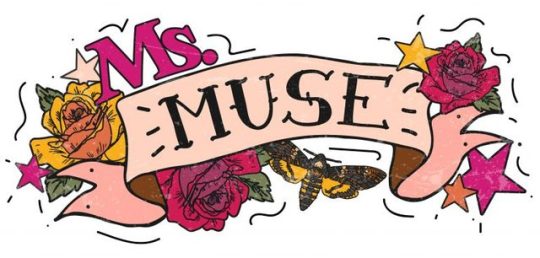
“There comes a point in everyone’s lives where we start to recognize that we are making choices, that we are determining who we are by the actions that we make,” poet, educator and activist Amy King stated in a 2015 speech at SUNY Nassau Community College, where she is a professor of English and creative writing. “What we do says a lot about who we are, not just what we say.”
As a young child growing up in the Bible Belt, King remembers going to the grocery store with her grandfather—her one source of stability, love and unconditional support at that time who, “everyday,” made comments that she was learning to understand were racist. She recalls watching her grandfather flirt with a Black woman who was checking out their groceries. “I was very young,” she told students about that day. “I didn’t even have the vocabulary at that point to recognize this feeling or to articulate what this feeling was, but it was the feeling that something hypocritical was going on.”
That was when King, who identifies as queer, began trying to figure out how to address those moments in her family. “A story begins when a protagonist recognizes a conflict and begins to address how to correct that conflict,” she shared, “and some of us choose not to address that conflict—and that is a story too.”
After growing up in Stone Mountain, Georgia, King lived with her father in Baltimore, Maryland. As a teenager, she worked for the National Security Agency after testing high for analytical skills, but says she felt “uncomfortable” there, even just at 17, and “didn’t like the way the institution was run.”
Two consistent themes throughout King’s life are “social justice and story.” Her latest book, The Missing Museum, is described as “a kind of directory of the world as it rushes into extinction, in order to preserve and transform it at once.” Publishing it won her the 2015 Tarpaulin Sky Book Prize and vaulted her to the ranks of legends like Ann Patchett, Eleanor Roosevelt, Rachel Carson and Pearl Buck when she received the 2015 Women’s National Book Association Award. (Named one of “40 Under 40: The Future of Feminism” awardees by the Feminist Press, King also received the 2012 SUNY Chancellor’s Award for Excellence in Scholarship and Creative Activities.)
King is co-editor of the anthology Big Energy Poets: Ecopoetry Thinks Climate Change and the anthology series Bettering American Poetry; her other books include I Want to Make You Safe, one of Boston Globe’s Best Poetry Books of 2011. Much of her prose, activism and other projects focus on exploring and supporting the work of other women writers, especially writers of color. King is a founding member of VIDA: Women in Literary Arts and former Editor-in-Chief of VIDA Review.
During a 2014 interview King gave for Houston’s Public Poetry Reading Series, she spoke on the subject of trying to understand poetry by asking a pivotal question: “What is ‘understanding’ and what is an ‘experience’ with a piece of art?” She went on to say poetry should “jostle” us out of our regular ways of thinking—it should “undo” us in ways that are both good and uncomfortable.
For this installment of Ms. Muse, King opens up about learning to speak up and step up—and shares three new poems with Ms. readers. Here’s to hoping that they “undo” you.
THE POEMS
Selling Short
I cannot afford to live in the city I teach in, & the number of people sleeping in cars has grown, indivisibly. This is not a dream of guarantees but the pursuit of handwritten freedoms that night the sting away. Demons of clinics devise distribution mechanics based on who you were born to & who you might know. The 2 a.m. quiet promises no solace or silence when days are hobbled & taken. Soon, light will be privately owned.
I’m Building a Body to Burn My Effigy In
I will not mention stars Today. They have been used for purposes not their own. Listen to them. Give them space. Observe but leave them distant. If you think you know everything about them now, you have outgrown yourself. In the south we say bigger than your britches burns, but I do not wish to confuse. I want to learn.
Joy Even
The denim and calico patchwork of my childhood. Mothballs in a little black box, felt lining each crevice. Michael Jackson on a hobbled turntable someone left at the apartment complex curb. Costwald Village. Regal. British. Anything but.
The dislocation of Backwoods, Georgia. The first time a man touched me, his semen glistening my inner thighs.
“Thriller” and the plywood coffee table. The hoarder grocery bag maze and Childcraft Encyclopedias flayed across the shag. My 12-year-old amazement. My 12-year-old embryo. The fact of a body electric, searing for days. Turning that birthed another world with a song and dance.
So many ways to joy. Some to death. My anything. Me, anything. Joy even.
THE INTERVIEW
Can you tell me about your process of writing “I’m Building a Body to Burn My Effigy In,” “Joy Even” and “Selling Short”?
I don’t have one process. Sometimes compiled notes take shape. Or a poem just falls out of me as if, gored, the liver drops from my body. The heart seeping sounds more fitting, but a liver plop fits better.
“I’m Building a Body…” comes from an interest in physics and mortality.
“Joy Even” is part of the slow-burn of outlining a memoir.
“Selling Short” emerges as predictive dream, touching on issues that have recently led me to Rosi Braidotti’s “The Posthuman.”
What childhood experiences with language informed your relationship with poetry?
When I first moved to live with my father in Baltimore at 15, I spoke slowly and heard the same. I often said “What?” in a deep southern drawl, uncertain of my own ears, which was probably also testament to a deeper uncertainty too. My father was my only safety line in a house full of strangers and with a stepmother who, quite quickly, began to play her own uncertainties out on me.
One day, as usual, I asked “What?” and my dad, no longer riding the romance of his daughter’s betrayal of her mother to be with him, the winner, suddenly shouted at me, “DO YOU REALLY NOT KNOW WHAT WE’RE SAYING?” It shocked the shit out of me. I made adjustments over time to alter the way I spoke, how I heard, to absorb unknown word usages and infer what I could. And to recover from what that moment meant.
You might prefer the story of how I used to read Gertrude Stein to friends over the phone to annoy them until I realized I had tricked myself as I was enjoying sounding her poetry aloud. Or how I grew up reading Nancy Drew and science fiction late into the wee hours and then woke up and watched Saturday morning cartoons in black and white. But this moment with my father shattered something. Luckily, the cracks are often where we make things and the broken pieces what we make things with.
I’m stunned by that moment with your father and your struggle to understand what people around you were saying. I’m also struck by the notion of the poet as a young girl not trusting her own ears, as you say. How did you learn to make out the words all around you–and to trust yourself?
I don’t think I ever have really. I just embrace the temporality of life a bit more than usual and go with what comes across. It’s why I am not embarrassed to ask someone to pass the “lotion” for the salad or to verb nouns for decades now. I think subconsciously I suppressed my accent as a response to my father, but that shock taught me that not only is my mother unreliable, but so is the alternative, my father. I had already been disabused of the notion of unconditional love; I was holding out hope in him for at least a lasting, warm embrace. I’ve grown since that bottoming out: DNA is not all, and one can find family—and become family—elsewhere.
This is all linked to the notion that people speak to signal group intimacy; language is shaped by mutual alliances and allegiances. When family rejects your language needs, believe the message it sends and seek anew.
Do you seek out poetry by women and non-binary writers? If so, since when and why? More specifically, how has the work of feminist poets mattered in your childhood and/or your life as an adult?
I won a city-wide fiction contest for Baltimore ArtScape during my senior year of high school. It was judged by Lucille Clifton, which made a lasting impression on me. I was not a writer, but my high school English teacher, Carolyn Benfer, encouraged me tremendously. I was attending a vocational school in the city and, up to that point, was destined to become a CPA.
From there, I attended the University of Maryland at Towson State and had the good fortune to enroll as a double major in English and Women’s Studies. The latter program is especially noteworthy as the program served as the model for many other Women’s Studies programs across the country, as envisioned and spearheaded by Elaine Hedges, who was also an active feminist, affiliated with the Feminist Press. This program led me to numerous marginalized writers back in the early nineties that I likely would not have encountered so early on independently or simply from core English classes.
I cannot speak highly enough about the work that Women’s Studies program did. The short answer is that the program taught me to seek work by marginalized writers as I would be missing out on so much otherwise. I do not seek literature simply to reflect my own experiences—I seek to learn beyond them.
What groundbreaking (or ancient) works, forms, ideas and issues in poetry today interest and concern you?
There is no one work, and as such, I continue to read widely. There are so many books I have not read yet, which is thrilling. Some of my touchstones range from Cesar Vallejo to Leonora Carrington to Audre Lorde to James Baldwin to Lucille Clifton to Gertrude Stein to John Ashbery. There are numerous younger poets I look to for energy, shifts in consciousness and awareness of current cultural concerns and who also signal structural and formal changes. A handful include Billy-Rae Belcourt, Chen Chen, Joshua Jennifer Espinoza, Vievee Francis, Airea D. Matthews, Raquel Salas Rivera, TC Tolbert, Ocean Vuong and Phillip B. Williams—but this by no means is an exhaustive list. Check out the poets anthologized in the Bettering American Poetry series I am lucky enough to be a part of.
As a woman, and as a woman who writes, what do you need to support your work? What opportunities, support, policies and actions can/could make a direct difference for you—and for other women writers you know?
Besides the room, money and time Virginia Woolf called for, I’m beginning to find that a support network is vital. I don’t think this needs to be formal or a writing collaboration. I simply mean that it is encouraging to have regular check-ins with a small group of writers, as few as two even, where you discuss what you’re each working on, maybe share a small piece/excerpt, get feedback and discuss ideas.
It is often the idea exchange, even with just a friend on the phone, that I find generative. I find myself articulating ideas and vision in a way that is as revealing to myself as to my friend. I leave those conversations with ideas of where to head next with a poem or on what to research to build foundational ideas for a concept.
What’s next? What upcoming plans and projects excite you?
I’m outlining a memoir—fingers crossed—and writing poems. I may birth an essay down the road, but that is gestating for now. And volunteering time and support to a program called La Maison Baldwin Manuscript Mentors, a nonprofit arts and culture association that remembers and celebrates James Baldwin in Saint-Paul de Vence, to save James Baldwin’s house and turn it into a vital residency in France.
How has the current political climate in the U.S. affected you as a woman writer?
I am not so much shocked as often startled. I think we all knew white supremacy, colonialism and toxic masculinity were at the helm, but the built-in invisibilities kept them shrouded in respectability politics and notions of civility, and of course, that begs the question: Whose civility? I also don’t think we are in some unique moment of history where shocking things have taken hold and the end is nigh, but that is how it feels at times. Power and paradigm shifts are often premised on tectonic shifts, and folks have to finally step up, choose sides.
That seems key at the moment: one can no longer pretend to be above the fray. And that may be most painful for those of us with privilege. No one is outside anything after all.
TAGGED:
INTERVIEW
,
MS. MUSE
,
POETRY
MS. MAGAZINE FEATURE - CLICK HERE - HTTPS://MSMAGAZINE.COM/2019/02/28/MS-MUSE-AMY-KING-POWER-STORIES-WEIGHT-CURRENT-POLITICAL-MOMENT/
2 notes
·
View notes
Text
Happy New Years everyone! People keep asking me about New Years Resolutions, and I usually reply by saying something I can’t control (like recovering from my injury, or not getting into another accident, or being free from incompetence and bureaucracy, esp. the former, or finally having the right woman in my life, or getting more recognition or “greater” assistance for my literary work, etc.).
I realize then that a resolution is something you can control—but then, I’m pretty much living a balanced life through and through. Outside of building on what I’m already doing (finishing Bad Americans, doing even more literary events, building The New Wei lit/art movement, hanging out with great friends, meeting more people, exploring the world etc.), there’s not much I would change about my own behavior right now.
That’s not to say 2022 was a perfect year for me, far from it, but despite the setbacks I still progressed on the whole, and very little of the bad stuff was in my control. I couldn’t control the accident, or how the insurance companies tried to screw me, but I could control how I responded, and I think that was pretty well, with honesty and force. I didn’t get two grants that I wanted, including for a dance musical based on The Dance Towards Death, but The Brotherhood Chronicle has won 15 literary honors to date, most in 2022, which is out of this world and which I could have never have imagined.
Of course independent writers are banned from the major literary awards like the Pulitzer Prize, National Book Award, Edgar Awards, so if I want more recognition, it seems Bad Americans would have to be published by a major publisher, which is trickier than it seems even for a complex and compulsively readable literary book, given its grittiness, honesty and provocative nature, but especially because, like Good Americans before it, it doesn’t fit into a solidly defined market, but rather seeks to expand it: it challenges what a literary book can be and redefines its possibilities. Publishers are rarely interested in such things, for whatever reason, even 10 years down the line, but I’ll have to make a greater effort this year on the conventional literary front (agent, editor, publisher, whatever).
That said, while I finished the second draft of Bad Americans, it still needs more work. I’m hoping the third draft will be the final one, and given how it’s progressing, that’s seeming more and more likely. I’ll give myself another year to work out the kinks. It could take another year after, but I’m hoping not. The goal is to produce the best book possible, not the timeline, of course.
Thanks to the many beta readers and others who’ve helped me on Bad Americans-I’ve gotten tours, held hours’ long-phone conversations, even with people in foreign countries, and gotten detailed (and I mean very detailed) feedback from many, many skilled volunteers. Also thanks to all the reviewers, readers and editors at many award contests/institutions, I really appreciate the time you took to read The Dance Towards Death especially, which can be a sometimes trying although wholly exhilarating/riveting experience, and of course to lauding the book’s merits.
And thank you to the many, many readers my books gained this year, these books exist primarily for you and to exist in your imaginations.
So my primary resolution is to keep on building this year. Except that I do want to change two things too. I consider myself a pretty even-tempered person, but there have been times when I’ve snapped, esp. at people I love, so I do want to get back to being more even-tempered. I feel like that changed after the accident and due to the stress I’ve been under, but that’s not enough of an excuse, and I want to do better. And also, I find some people assume me to be a fairly selfish person, which I think is unfair since I’m very social and generous at times, but I do want to be more generous this year—though not to the extent that people will take advantage of me.
So there it is. I’m looking forward to 2023!
#books#travel#thriller#book#author#mysterybooks#thrillerbooks#noir#mystery#traveller#travelling#bookstagram#authorsofinstagram#authors#travelphotography#crime#the brotherhood#thailand#the brotherhood trilogy#travelblogger#the human tragedy#good americans
1 note
·
View note
Text
40 years ago I was born this evening at Flushing Hospital in New York City.
40 years later, not only am I glad to be alive, but I genuinely feel I’ve lived such a full and amazing life and am happy enough that even if I died today, I wouldn’t feel bad about it or regret much.
I didn’t always feel this way, but I do today.
I can’t remember my 10th birthday very well at all. But I do remember being a relatively happy 5th grader, having transitioned to my Flushing elementary school from Corona two years before. I can’t remember if bullies were still bothering me then, certainly there were jerks and turncoats here and there, but I had good friends, we went on some good overnight field trips in Long Island. Oregon Trail and Cops and Robbers were fun (end of 6th grade was especially awesome, if you count in Connect Four sessions) and it was still a couple of years until the horrors of JHS.
I can’t remember my 20th birthday either, but I definitely remember the circumstances. I was working in my uncle’s motel in NC cleaning dirty carpets. This was between my sophomore and junior years at Wesleyan, but I was slated to go abroad for a year at Oxford in late September.
It had been an eventful summer, at least for my young life. I had decided to turn down an internship at Wesleyan University Press for a month’s job at the circulation desk of Olin Library because I had already committed to it; probably a bad decision, but one that likely didn’t affect me much in the long term. During this time I continued to develop my relationship with a sweet and beautiful girl I had met that spring at school, my first girlfriend, who lived nearby in CT.
After that month, I came back home, took a job teaching kids at an “elite” tutor academy in Elmhurst, Queens, and was promptly fired a week later because I “couldn’t control the kids”—first and only time I’ve ever been fired from a job, and probably the first and only time I couldn’t control the kids—ha ha.
Anyway, my uncle offered me a job doing odd jobs at his motel, so I took the Amtrak down South and began working for him. Even though the work itself wasn’t too inspiring, I did meet plenty of interesting people this way, and experienced a completely different atmosphere from the North, and continued to write (I had already written a novella, novel and short story collection at this point—all bad, of course—and had won a couple of awards for high school and college kids).
My flight back—I decided to fly—was on the morning of 9/11/01. My uncle dropped me off at the airport. At the ticket counter, the woman processing my ticket told me a plane had crashed into the World Trade Center (assumably, accidentally). I laughed it off. I thought she was kidding.
When I went inside the gate, I saw the news on the TV, and realized she wasn’t kidding. I can’t remember if I saw the second plane hit live or not, but it became quickly clear this wasn’t an accident, and that I wasn’t going to make it home to NYC.
Somehow I got in touch with my uncle and he drove me back to the motel. I still remember sitting in my motel room, watching people jump out of the towers while my girlfriend, on the phone with me, told me not to watch. I took the train back a week later.
I didn’t sign up for the military, and I didn’t get drafted, since the govt decided not to institute Selective Service. As usual, I decided to follow through on the commitment I had made, for better or worse. I visited Wesleyan briefly and saw my girlfriend and friends for the last time before I went abroad on a flight where even the flight attendant was openly racist towards me.
My year at Oxford was one of the best years of my life. I had tutorials where I could read and learn what I wanted, I wrote over 50 stories and essays, I backpacked Europe extensively, including alone, and had a “trans-chunnel relationship” with my girlfriend, who was studying abroad in Paris during the latter half of the year.
I experienced some racism in Europe, most of which I’ve never written about or even talked about publicly, but compared to my experiences in gang and crime-filled NYC as a teen, it was like nothing, and on the whole, it was a good experience, even though as a person, I remember being neurotic, paranoid, depressed much of the time, and of course insecure. But I had formed great friendships, I had an on-and-off again—but mostly on—gf, and I was physically in the best shape of my life (until, possibly, now).
I do remember my 30th birthday. I was depressed and didn’t do anything special but I did have a lonely meal at a Japanese restaurant and remember complaining to an acquaintance online about my depression.
I honestly felt like a complete failure. Both my long-term romantic relationships with two great girls (sweet, beautiful, brilliant, in love with me and much else) had failed. I blamed myself and frankly, I wasn’t worthy of either of them. While I had earned two masters degrees and had a decent job (maybe not for an Indian-American or whatever, but still, not terrible), I hadn’t gotten anything but rejections for my writing. I hadn’t been published anywhere since college, I hadn’t won any awards, I had no agent, publisher, college teaching gig, or anything else, even as many of my Wesleyan classmates (Lin-Manuel Miranda, Jason Pinter, Paul Yoon, to name just a few) had already achieved publication, fame and much else. Since I pretty much judged myself solely on this standard, at least professionally, of course, I felt like a complete failure.
On the social front, I still had strong friendships, and was developing more. I still had a solid family core. I was traveling and making more friends. I was single, and I still lived at home.
Fast forward to today, and I feel completely different. I’ve published four books, albeit independently, but I’m proud of them, and I feel like each book is better than the last. I’ve gotten great reviews, they’ve hit the Amazon bestseller lists, I’ve done solid interviews, been on TV, I’m active on social media.
I’m still single after more than a decade, and I still live with my family, and I still don’t have an agent (ha ha) but so what? I still have great friends, in fact, I have more than ever. I’ve strengthened many of the friendships I had then, even at distances, and made many new ones. I’ve traveled much of the world. I have friends and acquaintances of every race, religion, gender, sexual orientation, national origin, citizenship and residency.
I live in the greatest city on Earth, where I can eat any type of ethnic cuisine at any time of the day, endlessly explore any type of culture and where I have access to pretty much anything and everything of God’s plenty including art, literature, film, scientific knowledge, and much else. I’m content with my decision not to move to Cali, at least for now. So far I’ve survived the pandemic. I’m in great shape, and I’m better than ever at basketball. I’m happy. What can I really complain about?
That said, I’m hardly done. I haven’t reached anywhere near the literary fame and stature that I’ve wanted for decades. Given the odds, I may never, but I have to keep on trying. I’ve recently won awards and grants, something that never happened to me a decade ago. My next book, Bad Americans, is progressing well.
Having been a pessimist for much of my life, I feel positive and optimistic. I think the next decade is looking up for me, or at least I hope it is. I plan to write and publish many more books, and progress my literary movement The New Wei. There are plenty of other projects in the pipeline too, of various disciplines. I’m planning another road trip across the US and other adventures. Even my dating life is better than it’s been in years. Who knows, maybe marriage and the baby in the baby carriage is on the horizon (yeah right, you wish mom, but hey, anything is possible, right?).
My 40th birthday summer has been amazing. I visited a couple of good friends near Philly. I took my recently retired parents on a fun trip to the South, where we hung out with some of our large and beloved extended family. My parents are happy. My sister, who I rarely ever talk about publicly, is happy. My good friend Bob got married and I was his proud Best Man. We had two karaoke bashes with some Bayside buds. I’m planning on having dinner with some of my closest friends tonight, weather depending. Other close friends I’ll see later. I’m taking a trip to Providence RI over Labor Day Weekend with even more. I’m planning a subway musical reading. Some of my cousins gave me ridiculously thoughtful gifts. I could go on and on.
Life at 40 is amazing. I think it will keep getting more amazing. And even if it doesn’t, so be it. It’s life. There will always be hurdles, and it has to end at some point, right?
0 notes
Photo

This interview was originally published by the Humber Literary Review
So,
Yasuko Thanh is an acclaimed short story writer and novelist from Victoria, B.C. After winning the Journey Prize for her short story about an island leper colony, “Floating like the Dead”, she went on to gain wide acclaim for her historical Vietnam-based novel The Mysterious Fragrance of the Yellow Mountains. Her work often features spiritual or fantastical elements, as well as brutality and violence, and fixates on those who exist just outside the margins of polite society. Her latest is a memoir called Mistakes to Run With that details her upwards ascent from teenage prostitute to literary icon.
The Humber Literary Review’s Will Johnson caught up with Yasuko to talk about George Orwell, what it’s like to leave Christianity behind, and how it feels to be truly naked in public.
HLR: George Orwell once said “Autobiography is only to be trusted when it reveals something disgraceful. A man who gives a good account of himself is probably lying.” I thought about his words while reading your book, where it seems like you’re relentless about unearthing all your past foibles and sins for everyone to see. I admire your dedication to the truth, to introspection, but I wonder what compelled you to complete this public moral inventory.
Why share your darkest secrets and shames with such a huge audience?
YT: When I started writing this memoir, I was still in therapy after a stay in the psych ward. It was Christmas of 2016, and in a six months period I’d won the Roger’s Writers’ Trust Prize and been abandoned by my husband of nine years. Now it was Christmas and my new anti-psychotic meds were addressing the worst of my mental illness symptoms. I no longer spent each day contemplating how to take my life, so I stopped going to therapy, and convinced myself that the writing of the memoir could serve as a replacement for Dialectical Behaviour Therapy. All my life, writing has been a sort of processing mill for experience so this idea, of writing as pseudo-therapy, was nothing new.
I used my experiences to shed light on certain issues. I wanted to examine the stigmatization of street-workers, and its contribution to a social milieu in which violence against sex workers has flourished. The experiences didn’t have to me mine per se but they were the ones I was most intimate with. Stories come from everywhere but the best ones often come from our own lives, what we think and feel, who and what we care about.
At the time of the Pickton murders, the city of Vancouver propelled a harmful myth: that street workers were less valuable than other people. This thinking, this stigmatization of a group, was an obstacle to safer working conditions for them, and created the kind of environment on Vancouver’s downtown eastside from which nearly 60 women went missing.
Various studies have looked at why adolescents start selling sex. At the time I was working the streets, I often felt that Social Services and the legal system had driven me to it. I’d been denied Independent Living – welfare for youth under eighteen – I’d been jailed for shoplifting and could no longer maintain my career as a "booster." I had seen friends arrested and forced by the police to violently choke up whatever acid or hash they had stashed in their mouth. The sex workers I saw wore fur coats and red pig skin boots.
Money was the trade off for the conflicts I would experience with the law and abusive customers and pimps.
I spent much of my career in the sex trade in Vancouver.
From the age of fifteen onward, my life included prostitution, arrests, drugs, an abusive relationship, and struggles with mental health. In 1998, when I realized I was pregnant with my first child, I began to examine my past and consider what I wanted my future to be like. What would I tell my child about the kind of person I was?
The seeds for the memoir were planted back then.
My hope with this book was to begin a dialogue about the continued criminalisation of street-imbedded youth. A new model for understanding is needed, because their criminalisation entrenches them further in street life without addressing the social issues that put them there in the first place. I’d love for this book to spur a dialogue between legislators and the people for whom the skills and attitudes of the streets are logical means of survival. I’d love to contribute in some small way to the struggle for tolerance and open-mindedness.
HLR: In an interview with the Vancouver Sun, you said that you hate the “role of victim into which the sex-traded are often cast — because of all the accompanying pity”. I thought one of the most striking and refreshing elements of your memoir was that you never moralized about sex work, or wrote condescendingly about the people you met during that time. It was simply a choice you made, and a milieu you existed within, before moving on. That being said, the danger and violence associated with that lifestyle clearly took its toll both on you and others you love.
With all the stigma and misunderstanding surrounding the industry, is there something you’d like the average citizen to understand about that world?
YT: During the mid-1980s, right when I was entering the sex trade, working in both Victoria and Vancouver, I remember being chased from sidewalks with a garden hose, and men and women marching with placards. I hid behind dumpsters and waited for the mobs to clear. I was engaged with a profound feeling of puzzlement that people could be so self-assured without even knowing me or my name.
One night, when I was about eighteen-years-old, I was sitting with my friend Frances in a diner called the Korner Kitchen, on the same corner where we caught dates, the corner of Richards and Helmcken. We drank coffee in the vinyl-seated booth; she stirred in her sugar and licked the spoon before laying it on the table. Neither one of us could see ourselves turning tricks forever, and we shared the conviction that we’d be good at a multitude of things, if we only had a chance to try them. She wanted to be a teacher, could see herself in that role.
“But I wonder about a criminal record,” I said.
Both of us had one.
“With the kind of work you want to do,” she said, knowing I wanted to be a writer, “it won’t matter, anyway.”
The British philosopher and writer Iris Murdoch said that the goal of every writer was to cultivate what she called “true sight,” the ability to recognize other people really exist. I’m currently reading The Wisdom of the Body by Sherwin B. Nuland. In his chapter on “Biology, Destiny, and Free Will” he quotes Percy Bysshe Shelley. “Without imagination of another’s mind there can be no understanding of the other and therefore no love, and without love there can be no morality.” To be good, he says, is to imagine intensely and comprehensively the pains and pleasures of others. The great secret is love, or a going out of our own nature, an identification of ourselves with the other.
The intimate tone of a memoir made it the ideal genre to negotiate such intensely personal material, and I hope it gives people the means to walk a mile in someone else’s shoes.
I guess what I’d like people to understand is that we/they have names. We have parents, siblings, spouses, children. To understand that “there but for the grace of God, go I.” That everyone has an identity outside of the roles we play even if, or maybe especially if, that role is dealer, junkie, prostitute, panhandler, street kid, etc.
HLR: You were raised within an evangelical Christian context, but left the church and your faith behind as a teenager. This is a painful and confusing process, one that I went through, that often leaves people without something to replace their beliefs with. Have you ever been successful at filling the God-shaped hole? And is there any sort of spirituality you embrace?
YT: The spirituality I embrace is my personal religion of honouring anything and everything that spurs my writing. I deal with any number of doubts on a regular basis. Will I be good enough? Is what I have to say worth saying? Will anybody care?
It’s enough to stop you in your tracks.
But stopping isn’t the same as quitting.
And what keeps me going, and writing, is, at its core, akin to religious faith.
Writing is what helps me battle the daily truth that people are separated by vast distances. And one of my main motivations, one of the reasons I write, is because it helps me capture something from the inexorable, outward flow of time. It’s nothing less than a fight against my own mortality, and a balm against my sadness at the transience of all things.
“No man writes except to get out of hell,” Antonin Artaud wrote from an insane asylum.
I have to strongly believe in what I’m doing or I can’t do it.
Toni Morrisson, expressing a similar dichotomy, wrote that love “is or it ain’t. Thin love ain’t love at all.” That sums it up nicely.
I write all chips in, plunging ahead confidently, blindly, without real proof that anything will come of it, though maybe being published is a little bit like proof that one is on the right track -- but you can’t wait for signs. My belief or practice is based more on a type of apprehension: that, if I don’t write, something bad may happen.
I’m not sure what.
Maybe I’d stop being me. Or I’d go insane. Or the sky would fall. Not-writing is my version of hell.
I love the Wallace Stevens quote that goes: “After one has abandoned a belief in God, poetry is that which takes its place as life’s redemption.”
Reading can be a spiritual act, in the way it affects the soul. Writing, for me is a way of expressing my hopes and wishes, and in that sense, it is a form of prayer.
HLR: I’m working on a memoir at the moment, and one of the constant concerns is whether or not I’m honestly depicting the people involved—especially if the truth is less than flattering. I know you’ve changed some names, and utilized a composite character, but I’m sure there are people from your past who could potentially read your work and take issue with what you’ve written. How did you navigate these concerns while writing Mistakes to Run With, and how did you decide what to include and what not to?
YT: As you’ve pointed out, the people who share our lives may have very different opinions from us about what is appropriate and what is not to include in a work on nonfiction. I did ask one of my children about a specific episode in their life and whether they would feel comfortable with me sharing the story. They didn’t. So, out of respect for them, I didn’t include it in the book. However, the rest of my family and friends were fair game.
That said, my aim was not to vilify anyone, because that’s bad writing, and I even pulled some punches with the intent of creating well-rounded characters. Good writing portrays character with all its complexity intact. Though, I’m sure there are people out there who are angry about things I wrote about. My answer to them is, Write your own book. I knew well in advance that I wasn’t going to let friends or family read it before it was published. I didn’t want to be swayed by their comments. I didn’t want to censure myself. I think writing by consensus is kind of a terrible idea. Post-publication, I’m happy to talk to anyone who takes issue, but the idea of being vetted beforehand?
I think the prospect of allowing friends and family to sound in with their evaluations and appraisals of the work would make me too nervous to write at all.
HLR: I love how diverse your work is, and how you seem to effortlessly jump genres. Your next novel is about Julia Pastrana, a 19th-century woman born with a genetic condition that resulted in abnormal growths of hair all over her body. I’m curious whether you’re purposefully challenging yourself to try new things, or if inspiration just happened to take you there. How did you land on this particular premise?
YT: That particular idea came about at a time I was reading a lot of books on so-called “freaks.” One book I remember in particular was A Cabinet of Medical Curiosities but Jan Bondeson. I came across Julia Pastrana’s story in there. What intrigues me about her story is the fact that she married her manager and toured across Europe and North America, even meeting royalty according to some versions. The hook (for me) is the way the story can be read one of two ways: her manager was just another kind of pimp who married her and told her he loved her to keep his paycheck close to home, or he was a man who, despite her unlikely appearance, was able to look past her outer shell and see her, love her, for who she was...I like the idea of playing with both versions, and having portions of each stand in for the truth. I like the idea of, perhaps, the truth being unknown even to Pastrana and her manager.
We’re, all of us to varying degrees, mysteries to ourselves, often acting on our feelings whose origins lie in conflicting places. In these apparent dichotomies is where people come most alive for me. These contradictions in ourselves -- that’s when characters come most alive for me.
But here’s where I’m going to burst your bubble. That project has been put on the back-burner. Right now I’m working on two other projects. One is a collection of short stories with the working title, Death Rituals for a Modern Age. The other is a novel set in the present day, tentatively called, The Administration of Elementary Hopes. They share common themes of love and death (what else?) and I’m trying to lighten the load of the material through the use of dark humour, and in the case of the novel, the structure and tropes of the Gothic tale.
HLR: Quill & Quire once quoted you saying “a good scream is worth a whole couple of months of therapy.” You were speaking about your musical projects, including your neo-punk band 12 Gauge Facial. I imagine the artistic impulse involved in creating your music is different than the much slower-paced process of writing a book. How does music fit into your artistic practice?
YT: The artistic impulse involved in creating music is different than the much slower-paced process of writing a book. Music fits into my artistic practice like a really good chocolate bar between meals. It’s one of the things I do between writing different works, or to jog something loose.
It also gives me a chance to express in greater depth things that continue to haunt but that were glossed over in the memoir. You can’t fit everything into the pages of a book. If I had it would have made a better doorstop than a book. The original plan was to release an album at the same time as the memoir. My idea was that it could form a kind of soundtrack for the book -- but, alas, money and time conspired against me. That said, the project hasn’t been abandoned. Only postponed. I have sixteen original tracks that I’m hoping to release at some point in the near future.
HLR: I really appreciated the conclusion of your book, though I won’t share any spoilers here. What I appreciated about your approach was that you didn’t tie things up with a tidy bow, claiming your life issues are resolved, but rather acknowledged that you continue to be a work-in-progress (as we all are) with problems to face. Life doesn’t have endings, really, and neither does your book. Did you have to resist the urge to include a “What I’ve Learned” passage to the end?
YT: Resisting the urge wasn’t hard — in fact, I fought against this type of ending. Initially, the memoir ended many years earlier than the version which iI published. Both my editor and agent urged me to look at the material again, and consider extending the narrative up to the present day. In the end, I agreed to have the ending of the book coincide with the Rogers Writers Trust prize, and I’m happy I did so. But rather than have the book end with a Frank Capra-esque moment, where we know that everything from here on in is going to be rosy, I wanted to convey the sense that, as you said, life doesn’t have endings and we all are continuously working on ourselves by squarely facing our problems. I attempted to do this structurally, in terms of chapter headings, and through repetition of certain key lines or phrases.
I’m glad you think it worked.
The Literary Goon
0 notes
Text
The Master (2012) | Written and Directed by Paul Thomas Anderson
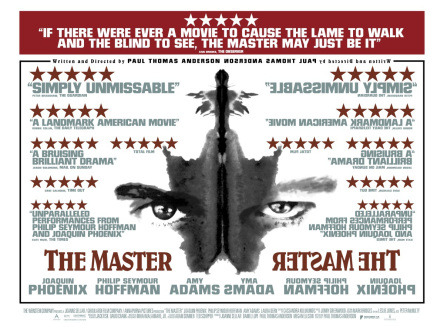
youtube
Intro and Technical Details
I try to figure out why I gravitate to certain films. Most of the time, it’s after someone asks me what my favorites are. I tell them, and then 90% of the time they don’t understand why I like those particular films. I’ve asked myself if it’s just some kind of wanna-be elitist, cinephile phoniness or something...but that’s not it. The reason I love films like The Master is due to their elusiveness. The Master shows you an approximate direction, but doesn’t overtly tell you what the answer is. In my eyes, this places it in a special category of cinema which is mysterious and often transcendent. It has something profound to say about us as humans and morphs with each viewing. It is alive because it doesn’t spoon-feed you an agenda or proposed concrete “truth” or “moral lesson”. My goal in this post is to take what I know and implement my personal thoughts and film knowledge to try to gain a better understanding of what this film is. This is my third post analyzing a film of my choosing. The first was about two women (Persona), the second was about a man and a woman (Cold War) and The Master is about two men. When people ask me what my favorite movie is, I tell them The Master by Paul Thomas Anderson. This is also PTA’s favorite film of his own. I remember the first time I watched it was at the NoHo Laemlle Theater a couple of blocks from where I live, right off of Magnolia, which happens to be the title of the first Paul Thomas Anderson film I ever watched. But while watching The Master that day in the theater, I remember feeling lost and dumb. I knew A LOT was happening but I didn’t know what. It left me behind. As a short filmmaker, when I first started (around the time The Master came out) I would just have stuff in my films (images, sounds, lines, etc) that were superfluous and didn’t have any legitimate reason for existing. My intentions were good...I was trying to create an atmosphere, even though a lot of the attempted atmosphere didn’t connect to the story or the idea being examined. I think it’s because a lot of the movies I was watching during that time I didn’t understand. I didn’t know why the director was making the detailed choices he or she was making. I still don’t always know the reason, but I do have a better idea. I must’ve thought these choices were just there spontaneously or by accident...for style-sake maybe! I was just going along the ride without consciously considering the nuanced decisions the director or actors were making. And oddly enough, this particular film is about a cult called “The Cause” and every cult’s main philosophy-based objective (in some odd form or fashion) seems to be to awaken your consciousness to yourself and/or to reality. If one is a film lover, and is so inclined to dig into this film, I believe one must watch consciously to understand it and not just go on the ride. And at first glance, one might make the mistake of thinking there is no rhyme or reason for certain moments, but Anderson is a filmmaker that does a vast amount of research and is very aware of what he’s packing in there. A literary example (which is much more elusive) is Finnegan’s Wake by James Joyce. Many believe Joyce was just goofing around with words, but if you read Joseph Campbell’s Skeleton Key or do some independent research on each phrase and term (if you have 10 years), one will realize there is meaning within the puns and riddles and melding-words. Finnegan’s Wake is a circular book and I believe The Master is a circular film. Finnegan begins again and I believe Freddie begins again. Roger Ebert gave the film 2.5 out of 4 stars and I love the first two sentences of his review: “Paul Thomas Anderson’s "The Master" is fabulously well-acted and crafted, but when I reach for it, my hand closes on air. It has rich material and isn't clear what it thinks about it.” Of course, I disagree mostly. I agree that the material is rich, but I think it’s clear what it thinks about itself more than Ebert thinks...and I’ll elaborate on this opinion throughout this detailed post. The next sentence in the review (after the quote above) is about how the Dodd character is based on L. Ron Hubbard, the founder of Scientology, but how in the film there is no clear vision of what the cult is or what it becomes. I believe we see quite a bit of what it is and we see that it has expanded to England by the end of the film. The film never lays out the exact tenets of the cult in list form, but Dodd himself is making it up as he goes along and this is expressed multiple times in the film. I also believe enough is revealed to get a fairly good idea of the cult’s philosophy and the methods being used for “curing”. Also, in my opinion, I don’t think understanding “The Cause” is entirely relevant to what the film is trying to say. The film is mainly about the symbiotic relationship of the two main characters, Freddie and Lancaster. I rewatched There Will be Blood last night (Anderson’s film before The Master) and the thought came to me that you have to watch the expressions of the characters closely during these films and follow what’s happening inside of them. This seems so obvious to point out, and could definitely apply to any film-watching experience, but the acting in Anderson’s films is so strong and subtle one will be lost unless you watch the silent moments and what the faces show you. I'm really trying to pick the right words to express this...but you have to consciously tell yourself while watching (in your thoughts) what’s happening with these complex characters if you want to understand the transitions. I don’t think the camera movements are as important in The Master nor the lighting, but it’s the characters’ internal life expressed in their faces manifesting from their psychological states, needs and wants. Of course, Freddie’s gait is a big part of his character and various body language from the all the characters are important, but their faces tell you most of the story. Also, I believe some knowledge of Spiritualism is needed to bring to the table, but I don’t think it’s absolutely necessary to understand what the film is trying to say. But anyway, perhaps I’m over-explaining too soon. I was trying to figure out how movies like this get away from people (including me) and cause so much confusion. The last time I saw the film was about 6 months ago at The Egyptian Theatre in Hollywood where the premiere was in 2012. The screening I saw may have been the same 70mm print from the premiere, but I could be wrong. I just tend to think there’s not too many 70mm copies out there. The Master was the first fiction film in 16 years to be shot in 65mm and then 5mm is added for the audio track. I didn’t know for a long time the reason why such a big film stock made a difference, but apparently it’s because more information can fit on each frame, therefore it’s crisper and more details can be seen...which makes it epic and ambitious and a filmmaker is really swinging for the fences if they use this big stock! Anyway, there was quite a large crowd at the Egyptian and I remember laughing at a few spots where no one else was and kinda had to pull myself back. I also remember noticing a lot of things I hadn’t noticed before and I’m sure this will be the case when I rewatch it again for this post. Before getting into the film, I'd also like to mention I will probably come off as a bit of a fan boy in this excerpt. It is because I believe Paul Thomas Anderson is one of the best filmmakers in the world of the past 25 years and has much to teach in a field that I’m passionate about. Also, I believe The Master is a master-piece and there are new interpretations of depth and reference that I am still uncovering (or think I’m uncovering).
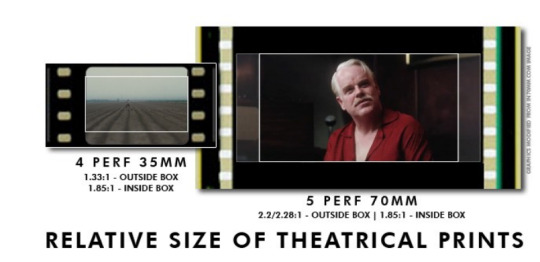
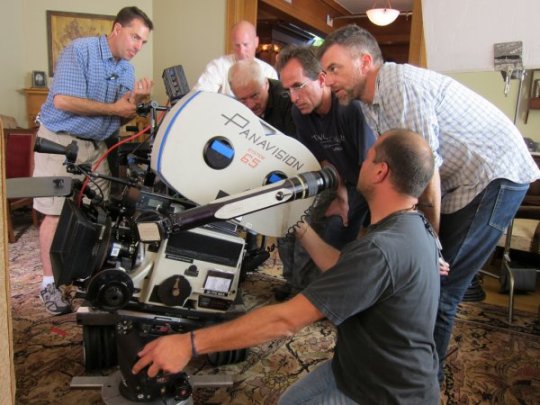
Freddie Quell, Navy Man at Sea
The opening shot is of aqua blue water behind the back of a ship, which is also the dominant color in the palette of the film and the color I think of when I think about the film. Johnny Greenwood’s score crashes in and then we see the first shot of Freddie Quell in a bunker with a military helmet on. I can’t remember where I read it but Paul Thomas Anderson told Joaquin Phoenix to mimic the monkey in the hot spring from the documentary Baraka for this shot, which also coincidentally was filmed in 65mm. I’m sure it's partly a nod to the film’s use of the same stock size, but I also think it's covertly setting us up for Freddie’s animal-like nature...or pointing to the animal-like nature of war and how this particular primate, Freddie, is expected to change his entire behavior, which is attempted by Lancaster Dodd throughout the film. Simplistically put, Freddie indulges in his animal nature. Dodd denies it. A dichotomy that will also act as a magnet between the two throughout the film and something that I will point out several times. Also, we wonder if war broke Freddie or was Freddie already broken? Or is he actually “broken” at all??


We immediately see that Freddie drinks heavily and how he is markedly different from the other soldiers in the group. He takes things too far and is much cruder than the others. He drunkenly simulates sex with the nude sand woman the guys have made and then masterbates into the ocean. He then lays down and closes his eyes next to the sand sculpture bosom, almost oedipal-like, sweetly spooning its side. This exact same image will pop up again and I believe it holds a large significance in the key to understanding the film.
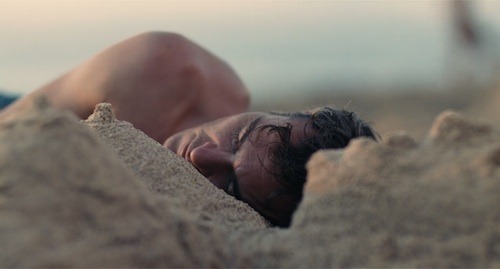
It is next revealed Freddie can make booze out of pretty much anything as he drains what looks to be the ship’s missile fuel into a cup. This also seems to be Freddie’s way of making friends with the other troops, as it is simultaneously announced that World War II is over. The camera scans the room and shows all the interesting yet shell-shocked faces of the troops as it’s explained to them by their superior they are now able to enter the world. They are told they can now open up their own businesses with the skills they’ve acquired. This doesn’t come off so much as anti-war, but obviously points out that a lot of these men are damaged psychologically, and the military either comes off as naive or willfully ignorant regarding the mental state of the guys entering the world post-service. This is magnified by a comical scene of Freddie sitting in a room with a hardened military psychologist who shows him rorschach blots as Freddie interprets every single one as extremely sexual. Phoenix is amazing in these closeups and the camera is able to hold on him for long periods of time. This was after his fake retirement from acting and I think he was hungry for this film. His face is gnarled with lines. He has this mumble that’s slightly distracting but makes you lean in as he moves in and out of the camera’s shallow depth of focus. This film has so many closeups and doesn’t include the long steadi-cam and dolly shots like in Boogie Nights or There Will be Blood. The comical scene is followed by a sad scene showing us that Freddie has some real psychological pain. He talks little and very uncomfortably to another military psychologist about his family and an old sweetheart. Freddie mumbles, “you can’t help me” and later sarcastically says, “thanks for the help”. Later on we wonder if Dodd gives him real help opposed to these psychologists.

Freddie Enters the World
Freddie has a job as a photographer in a department store. The portraits look lovely. The song underneath during this scene is perfect (”Get thee Behind Me, Satan” by Ella Fitzgerald).
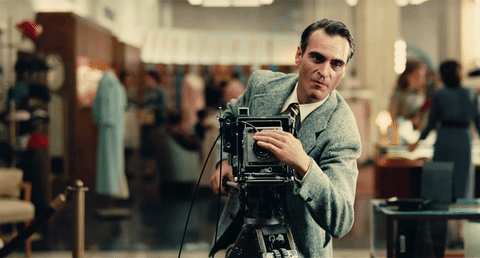


Freddie flirts with a woman that models clothes for customers. He later then mixes some of his potion in a photo-chemical room like an Alchemist. They both drink from the flask and then kiss. She shows him her breasts. Freddie asks her to go out that night, which cuts to Freddie passed out drunk at the restaurant table and the woman annoyed.
The next day Freddie is hung over at work and gets into a fight with a large male photo client. Freddie comically runs from the man and throws various items at him while dodging and weaving behind columns. The camera covers the commotion in wide shot in the department store so well! Then Freddie does something peculiar and funny by grabbing the hand of the model (his date from the night before) like he’s leaving the job and she’s coming with him. She looks at him baffled as they hurry out. Music comes in perfectly here (once again) with a jagged discontinuity of woodwinds which takes us to Freddie now working in a lettuce field in Salinas, California. The shift to this new, vastly different environment is dreamlike. Freddie continues to make booze and gives some to an older man that Freddie says looks like his father. The man gets ungodly drunk and Freddie is run out of the work group after being accused of poisoning the man, which leads to one of my favorite shots of the film. It is a long tracking shot of Freddie running through a foggy field away from the workers chasing him. I liked it so much I tried to slightly copy it while shooting a silly annual family short film in a cotton field in Texas, also running away from farmers. And worth mentioning (assuming my short film is worth mentioning), I remember reading somewhere that Paul Thomas Anderson read about the life of John Steinbeck (from Salinas, CA) and incorporated some of the stories in The Master.
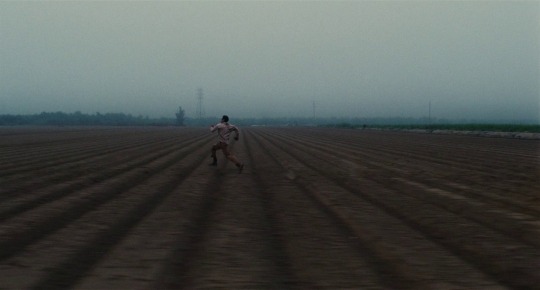
The Master (2012) Paul Thomas Anderson (Panavision 65mm)

The Jackel (2016) Cory Aycock (Canon 7D Crop Sensor)
Freddie Meets “The Cause”
Next, it cuts directly to Freddie walking on a dock, looking cold and dejected. In the distance is a boat docked with a lively party and warm lighting. Music plays and we get our first glimpse of Lancaster Dodd. He dances charismatically with his wife in the middle of an admiring group as Freddie, the misfit loner, decides to sneak onto the boat. The boat is then shown setting out to sea, which looks to be departing from San Francisco under the Bay Bridge.
The next morning, Freddie is hungover and has a humorous conversation with Lancaster, the leader of “The Cause”. Such a great opening scene with these two and Phillip Seymour Hoffman is so great in this role. I think it’s his best performance...but I’m biased. As mentioned, the conversation is humorous, but not funny-haha. Again, I will try to explain as best I can what I feel when watching some of these scenes... They talk in such a way, not necessarily about funny stuff, but they are such characters and there’s such chemistry it puts a smile on your face. You see the inner-game they are both playing and it’s delightful to watch. They are opposites, which creates this lively synthesis and makes you laugh sometimes, but also gives you such a large mindscape to enter during these rich, concentrated dialogue sessions. In this first conversation, Lancaster and Freddie both mention that the other seems familiar, which comes back later. Their association is sweet yet ridiculous at times. A likable naivety exists, but also a sense of intrigue and darkness lies underneath. Dodd tells Freddie, “I am a writer, a doctor, a nuclear physicist, a theoretical philosopher...but above all I am a man...A hopelessly inquisitive man, just like you.” And shortly after calls Freddie a scoundrel, but asks him to make more of his secret booze. A young Rami Malek, Clark, pops up next in the film and is marrying Lancaster’s daughter, Elizabeth. The first interaction we see between Hoffman and Malek feels like a Tom Cruise-like stareoff. Malek stares until Hoffman ducks his head in slight awkwardness. This trivial detail always catches my attention and I’m not sure why. Lancaster gives a speech after the ceremony in triangular blocking. This is my favorite speech of Dodd’s in the film. He is at his most charismatic and funny here, in my opinion, and touches on some of the philosophies of “The Cause” in symbolic terms. He talks about lassoing a dragon and then teaching it stay, then roll over and play dead. I’m almost positive this serves as a metaphor for taming the ego and/or reactionary mind, then learning how to navigate life playfully following this “enlightenment”. Freddie shifts in his drunkeness from confusion to laughter while continuing to compulsively drink all the alcohol in sight counter to the simultaneous speech.
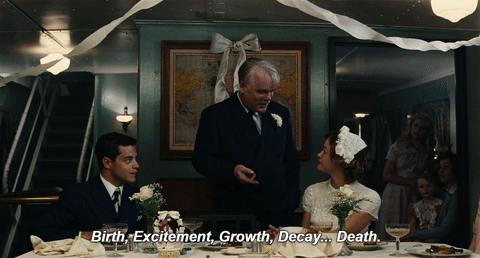
Although, Lancaster loves Freddie’s booze and, again, secretly asks for some after the speech. Freddie’s process of procuring this solution is somewhat like a mad alchemist and shown multiple times in the film. To me, this could metaphorically point to some type of alchemy forming between the two opposite characters considering the psychological and metaphysical tone of the film. It is also revealed the next morning by Amy Adams’ character, Peggy (Dodd’s wife), that Freddie inspires something in Dodd and he has been writing much more since Freddie showed up. Peggy has asked Freddie to sit with her at breakfast, possibly to see what it is about him that could possibly spark this insight in her husband. Despite this, I don’t think Peggy sees anything special in Freddie and doesn’t understand their relationship for the remainder of the film. Actually no one, besides maybe Elizabeth, sees anything worthy in Freddie at all other than Dodd. I believe this is because Freddie fills a unique gap within Dodd. I will expand on this more later, but to me it’s obvious Freddie is filling the gap of the id. Freddie is a scoundrel, an open drunk, a philanderer and a wanderer. These are things Dodd isn’t. He forbids himself of being this and Freddie is counter to this persona of Dodd’s, who is a leader, married and always ON. He is relied upon by his followers, always maintaining his status as prophet for the cult...perhaps the superego. Soon it is revealed there are “processing” sessions occurring on the ship, recording “past lives”. Everything is being put on tape of what people are saying during these sessions. Freddie humorously navigates the ship during all of this. At one point he sits at a table and puts on some headphones and it’s Lancaster’s voice deliberately stating, “We are not animals.” “We are not a part of the animal kingdom.” Simultaneously, Freddie looks across the table at a young woman and passes her a dirty sexual note. She goes back to work as Freddie watches her. The sun behind him shines through the window and perfectly peaks behind Freddie’s head. This is what I meant at the beginning of the post...the film is showing you something regarding the ideas it is trying to express. In this moment it’s not necessarily just in the face of the character, but in what Dodd says in the headphones in direct opposition to Freddie’s sexual note and then the sun winking at us from behind. For some reason, it makes me cringe to analyze some of these moments... demystifying and deflating the “magic” of these details.
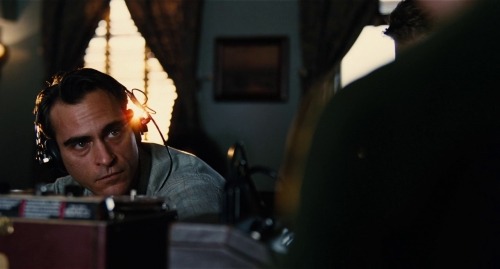
The distinction of “animal” pops up periodically a few more times in the film on the account of Dodd. Again, Freddie (the animal) and Lancaster (the divine) forming a fully whole being. Now, at the 36 minute mark, the best scene between two actors sitting across from each other at a table I’ve ever seen. It reminds me a bit of the scene in Persona where the two women sit across the table from one another when they meld. They also repeat the dialogue here like in Persona and Dodd dresses down Freddie similar to Alma’s dressing down of Elisabet. The face lighting in this scene is also similar, half-lighting the characters but in a dark Charlie Rose-like room directly counter to the white background in Persona. The scene begins by Freddie being processed after a drink with Lancaster. Lancaster asks him probing questions about his life and records it. The scene is funny, dark, raw and nuanced. I can’t say enough about this scene, there is so much here. Phoenix moves and looks around. Hoffman stays still, centered, not breaking eye contact. The first time around, Freddie doesn’t take it seriously and farts in the middle of them talking. Lancaster playfully calls him a “silly animal” and ends the processing session soon after by turning off the recorder. Freddie seems disappointed and wants to do it again. Lancaster sets up the rules this time and tells him he is not allowed to blink during the questioning. Freddie agrees. In somewhat Mesiner-like fashion they continue the exercise in a long closeup on Freddie. Phoenix is amazing here and at one points slaps his face multiple times after he blinks. They start over. Tears roll down his face. Apparently Freddie is severely troubled by his family past and recalls a sexual relationship he had with his Aunt. Then he reveals he was in love with a girl in his hometown named Dorris. It beautifully cuts from the black, heavy room to a bright sunny day and the white house where Dorris lives with colorful flowers in front. This is a beautiful contrasting cut by Anderson transporting us. Also, worth pointing out, is the contrast of how silly the scene started with farts and laughter, then taking us to this this deep, heavy pain within Freddie.
youtube
This is a unifying scene for Freddie and Lancaster. And despite what we think about the legitimacy of the cult, some type of deep psychological progress with Freddie is being made here...a progress that was not even close to being accomplished with the military psychologists. Or is this “progress”? Feels like it. As Freddie comes back from the flashback, it cuts to the aqua blue water again, similar to the opening shot of the film, perhaps personifying Freddie’s current mental state. The color of Freddie’s shirt also matches the color of the water.

Again, there is a charming naivety within Lancaster regarding “The Cause” during his far-fetched final questioning lightening the mood before the two have a drink and smoke a Kool together.
youtube
Funny outtakes at the end of the scene.
Obviously, Dodd is modeled after L. Ron Hubbard, but I don’t think it's a nasty rebuke or hit piece, nor is it an exact replica. I read Anderson and Tom Cruise remained friends after Anderson showed it to him. If one thinks it’s mainly a film about Scientology then they are absolutely wrong. It’s evident Anderson loves these characters in spite of all their flaws and complications. Dodd remains a believer of his own philosophy throughout the film, which I think keeps him likable. You also believe throughout he wants to help Freddie, even though some of that motivation may be ego-based or material for his writing. He is misguided at times but cannot be broadly painted good or bad and does not come off as maliciously pumping out nonsense solely for monetary gain. You believe he believes.
Sea-Legs to Landlocked
The ship now arrives at New York City and the group attends a fancy party at a home. You get the feeling this new spiritual movement is in vogue. Freddie goes straight for the booze and also begins stealing random stuff around the house. Lancaster schmoozes, then is shown performing a processing exercise for a woman laying on the couch for the party crowd. This last time watching, I got the feeling Dodd was curious what she would say and that every session he conducts he secretly sees as an experiment, collecting more data for himself rather than having a fully realized philosophy or completed methodology.
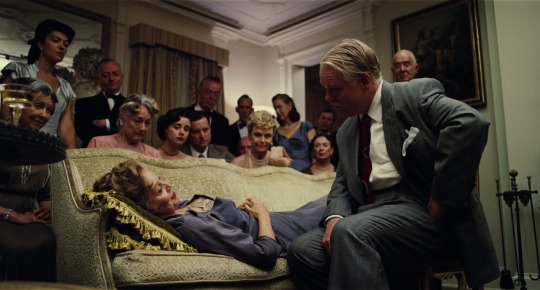
I’ve read Dianetics, so I do believe I have more insight into what’s going on in some of these scenes than a regular viewer. Although, I also believe the information is already there in the scenes if one pays close enough attention. And I’ll say it again, “The Cause” is not a carbon copy of Scientology. But, to generalize, the quest of both seems to be the same...to reach a state of “perfect” (or “clear”) by cutting through past traumatic memories and lifetimes (when the “analytic mind” was unconscious) in order to tame the current reactive mind. After processing, the woman on the couch talks about her past life and Dodd answers some of her questions. Then, a naysayer from the party verbally challenges the legitimacy of Dodd’s claims. "The Cause” is no longer confined to the vacuum chamber that is their boat. Dodd raises his voice in anger and Peggy looks visibly rattled as well. Lancaster eventually loses his cool after the naysayer continues to not back down and calls him a “Pigfuck”, which makes me laugh every time. This is the first time we see Dodd lose his composure in the film. Freddie is observing off to the side and throws a tomato at the guy, probably something Dodd wishes he could do. The party guest is obviously convinced there is no way to have a logical discussion regarding “The Cause” with Dodd and he’s right.
A quick aside and personal story...the actor playing the Party Guest Naysayer is named Christopher Evan Welch. I briefly worked backstage at the Mark Taper Forum in Downtown Los Angeles and Christopher was one of the actors in a play when I was working there. During one of the shows, while waiting for his time to go back on stage, he sat with me for a while and asked me questions about what I wanted to do in the business and where I was from, etc. I was still pretty green. I remembered him being very nice and authentic. This must have been around the time he worked on The Master because it was in early 2012. The next year I found out that he died suddenly of Cancer. Hoffman died not too long after. Very sad. The full scene is below with Welch and Hoffman:
youtube
Dodd and Peggy are upset now in their room after this fiasco. Dodd writes furiously as Peggy speaks, putting words to their anger, completely flabbergasted by this mild rebuke. The whole group is bent out of shape, shaken by this challenge. Freddie, next door, elects to take Rami Malek’s character (Clark) to the naysayer’s room to rough him up and they do (or Freddie does).
The next day Dodd pretends to scold Freddie, but it’s obvious he’s glad he did it. Again, Freddie being the id that is unrestrained and not held down by social convention in direct opposition to Dodd’s persona. This is where something similar comes in comparable to Scientology, because Scientologists are known to go after naysayers, sometimes aggressively. The group nows arrives at a large house in Philadelphia belonging to Laura Dern’s character, Helen. Everyone gets out of the car like a big happy family visiting relatives and you really feel the warmth of their community here. Different courses and talks are being held at the home. Dodd’s daughter, Elizabeth, makes a move on Freddie during one of the talks and Freddie resists. She is a redhead just like his past sweetheart Dorris. In the previous scene, Freddie was ready to go find the naysayer and Clark seemed apprehensive until Elizabeth gave him a look to go. She seems to like Freddie’s aggression. Plus, perhaps, her father’s closeness with Freddie has something to do with this attraction. There are moments when Freddie’s face, with all it’s interesting lines, drifts to another place and the sound completely fades as Anderson holds the shot on Phoenix in closeup. Anderson does tons of planning and research, but you get the feeling on the day during filming he’s constantly looking to catch moments of spontaneity and it seems this choice to hold on Phoenix during this particular moment is a good example.
Freddie continues to get completely wasted alone amongst the others, shown during a party as Lancaster sings and holds court. The scene afterwards always makes me laugh really hard (no pun intended) when Peggy jerks Lancaster off in the sink while making him agree not to drink anymore of Freddie’s booze. She continues to jerk and tells Lancaster if he’s going to cheat on her to not let her or anyone else she knows find out. Lancaster eventually comes and doubles over as he lets out a few violent pleasurable yelps. This is the closest to the animal side we see of Dodd, and this spirited release may point to the pressure build-up. Peggy then walks into the dark room where Freddie is passed out and tells him there will be no more boozing. He reluctantly agrees upon waking. Yet the next scene (the next day) shows Freddie continuing to drink heavily on the sneak. The Philadelphia Police show up at the house suddenly to arrest Dodd for running a medical school without a license. Dodd gives himself up relatively calmly and in contrast Freddie fights wildly with several police who violently wrestle him to the ground and handcuff him. Then there is a wonderful scene following, setting up the two protagonists’ contrast in temperament even more when Freddie is hauled in and put in the cell next to Dodd. Dodd is cooly standing still and calmly leaning on his bunk. Freddie is abruptly being dragged in by four officers, and immediately starts DESTROYING his cell as Dodd just observes. Dodd possibly feels this rage inside but has elected to consciously watch his rage rather than react as Freddie is. Then the two get in a hilarious, childish yelling match after Dodd tries to explain to Freddie why he is how he is. He tells Freddie the cause of his affliction is due to an implant from millions of years ago and that he is asleep (lining up with Scientology). Freddie isn’t having it and says he’s just making it all up as he goes along, echoing what Dodd’s son said to Freddie on the porch right before the police showed. Dodd yells back that no one likes Freddie except for him. Both of the characters have told each other a truth. Dodd then says he’s done with him and begins peeing in his cell toilet. Yet Freddie has no pot to piss in because he’s destroyed his cell, including his toilet. In fact, he may have also destroyed his relationship with Dodd, which would likely mean he will not have a pot to piss in for quite some time.

During a quick arraignment scene with Dodd, the Judge orders him to repay the $11,000 he took and gives him this look that has so much character and makes me smile every time. He cuts his eyes up in this humorously scolding way as he simultaneously hits the gavel. With these great films and directors and actors, you learn that even the smallest scene is packed with so much richness and detail and not wasted!
Dodd is now at the dinner table with his family. Freddie is still in jail. The family open up to Dodd voicing their concerns regarding Freddie. They want him gone. Dodd says they must try and help Freddie get well, perhaps Dodd trying to find a way to keep him around. Now a wide shot outside of the Philadelphia house. Dodd is sitting up on the porch with several others and there is a little girl on a tricycle in the foreground below the steps. Freddie sheepishly approaches the house after being let out of jail like the prodigal son. Dodd cooly embraces him. The little girl runs up the steps into the house. The two men then start wrestling like little boys in the yard, the two halves reconciled, laughing hysterically.

Freddie Quell, Patient of The Cause
Freddie is now being “treated” and/or administered tests in front of about 30 people in the house to “cure” him. Dodd tells him to go from one end of the room to the other, to feel the wood wall and describe it, then walk over to the glass window, feel it and describe it too. He continues this over and over.
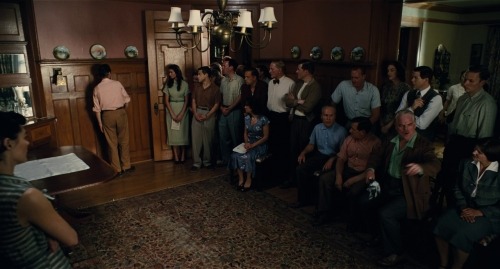
Paul Thomas Anderson is a filmmaker that walks in front of you and you have to catch up. He does this by overloading your mind with scenes that just start and don’t have a lead-up. You have to wait, then you find out. The strength of the music, cinematography and acting lays so much subtext in front of you, it can keep you from following what’s actually happening...which, oddly, I feel is part of what great cinema is. It’s a great distraction...a created atmosphere so thick that one can be swept away by it if they don’t watch out. For example, the first time I watched this film I thought I had an idea what was happening, then I realized I was wrong, but I had already overthought in the wrong direction so far I became completely lost and just sat there asking myself even more wrong questions in my head about what was going on until the credits rolled. I did the same thing in the same theater with Inherent Vice a few years later. In the next scene there is another exercise where Freddie sits across from Clark and is not to react to anything he says, including personal insults. He cannot react in any way (laugh or talk, etc) or Dodd will start over the exercise. This reminds me of the Synanon Cult and their ”Attack Therapy”. The cult used to be located in Santa Monica where the hotel Casa Del Mar is now and I’m sure Anderson had heard of them growing up in LA. Clark immediately says “Dorris” and Freddie breaks right away, looking to Dodd knowing Dodd told Clark to say this. Dodd replies, “Fail” and they have to start over. In my opinion (and I think I’m right) Dodd wants Freddie to get to a point of non-reactivity, possibly closer to a state of “clear”. All the individual’s insecurities are placed in the forefront consciousness (also why they record everything) and then the individual has to face these thoughts head-on until the past is dealt with and the former traumatic memories no longer abscond the self, opening the individual to infinity. The individual must face the shadow in other words, becoming whole by “mastering it”...taming the reactive mind or “dragon” as mentioned in Dodd’s speech at the wedding. Once the dragon is tamed then one can teach it to “roll over and play dead”. Am I being indoctrinated too??
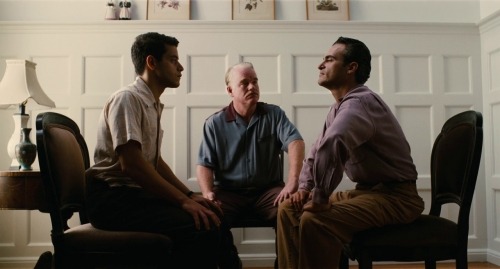
Next, Peggy reads Freddie sexually explicit passages from a book in a Demme-like closeup and Freddie is not supposed to react or say anything. Dodd excludes Freddie from eating lunch with the group and makes him stay inside the house continuing the exercises where he continually has to walk back and forth and feel the wood wall and window over and over again. Freddie is at a point now where he names the wall and window random things like “moss”, “rocks” and “barbed wire” as he touches them. My guess is this is an exercise to break down his sense of language....or just break down his mind, because it’s obvious to Dodd he needs to be broken down. I also think Dodd is using this as an experiment for his methods to see what “works”. He watches from outside as Freddie, alone, continues to walk back and forth. The camera pushes in on Dodd and his expression is one of curiosity as well as remorse, yet still barks out orders, “Back again!”.
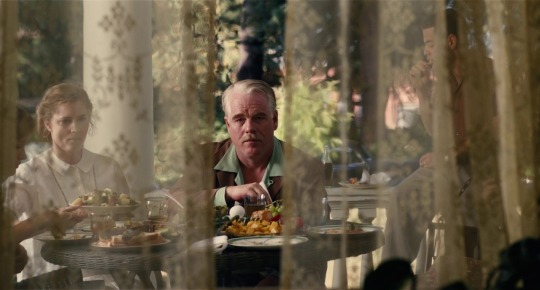
Shortly after, he explains to Freddie that it is a slow, hard process and Freddie looks mentally exhausted. But, eventually, Freddie starts making progress and is becoming stronger. Is it really working? Rami Malek (Clark) is so monotone and annoying here, it really shows Freddie has to be strong to take his insults during the exercises. Peggy even shows compassion for Freddie at one point, one of his biggest naysayers throughout the film. To shift to something technical for a second, I love how the flicker of the film looks in these closeups on Joaquin Phoenix! You can really notice it in the 4K Version. I also remember being very aware it was shot on film while watching the 70mm version at the Egyptian. I know it’s very cool to like film, but I really do authentically enjoy the look of it.
Freddie now does the wall/window exercise with manic energy. There is one moment when Joaquin Phoenix is jumping up and down and almost hits his head on the chandelier’s metal point...and it looks as though Hoffman gets out of character for a sec to block Phoenix’s head that narrowly misses it. Freddie is back feeling the wall like he has hundreds of times, then goes over to the glass again, feels it and deeply says he can touch the neighbor’s plants...the stars...anything he wants... This is not a big moment magnified by a music cue or closeup, but Dodd says enthusiastically “End of application!” Freddie has succeeded in completing the exercise. Perhaps Freddie has now transcended and touched infinity in Dodd’s opinion, realizing he can touch anything he wants (mental freedom), seeing the infinitude in something simple and ordinary like a glass window. Perhaps he has gone through the iterations of the exercises enough to become “clear” (the word “clear” is never used in the film). Dark, foreboding music now comes in during a shared hug between Lancaster and Freddie. In my opinion, the music foretells the bleakness of certainty Freddie is 100% cured.
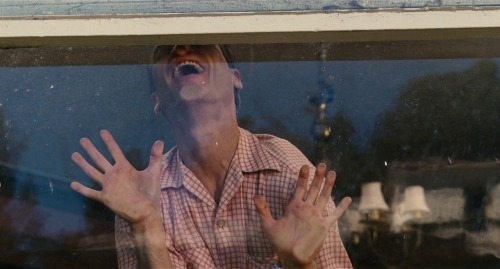
In the next scene, Peggy announces that Dodd’s new book will be presented in Phoenix, Arizona. After watching a few times, you realize that the work done with Freddie was most likely the catalyst for Dodd finishing the book after administering all the exercises. The film obviously doesn’t come out and say this directly, but we know Freddie has inspired Dodd’s writing, his son earlier revealed that Dodd is just making it up as he goes along and this announcement about a new book comes directly after Freddie “successfully” completes the tests. Also, is it a coincidence the city picked for the new book event is the last name of the actor playing Freddie, as well as the symbolic mythological bird that rises from the ashes after a rebirth?
Dodd and Freddie now are at a remote, desert location I assume is outside of Phoenix. They dig up Dodd’s unpublished work that had been buried. Lancaster carries a gun and looks around to make sure no one’s watching or, maybe, if a magic event might manifest. The score by Johnny Greenwood here is amazing. Again, with the two characters in this scene there is a wonderful naivety regardless of the ridiculousness of digging up this essential manuscript for “The Cause”. They are like two kid soldiers out in the great beyond full of wonder and purpose. And the shirt Dodd is wearing in this scene is hilarious.
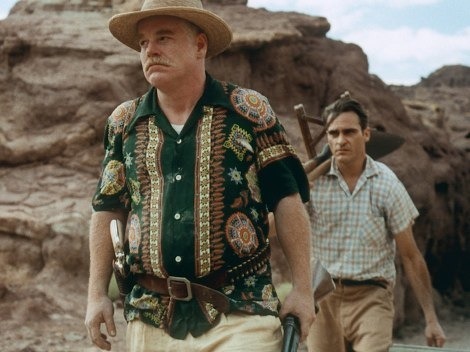
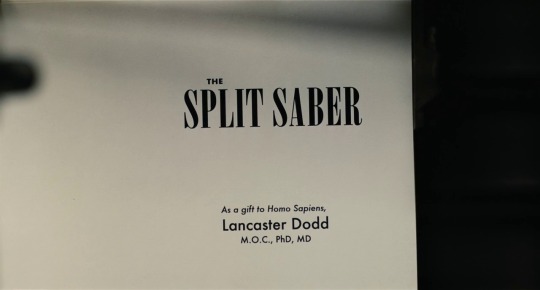
“The Split Saber” is printed on the press. Freddie takes pictures of Dodd, which are funny and sweet. I’ve included a pair of photos below that look to be influenced by photos taken of L. Ron Hubbard.
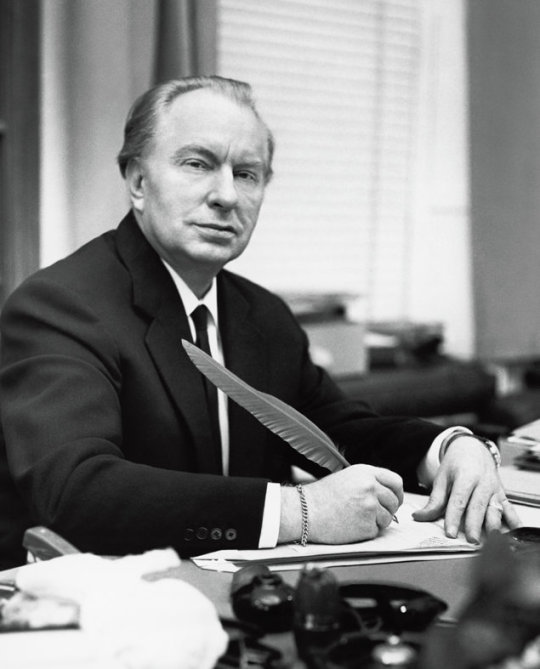
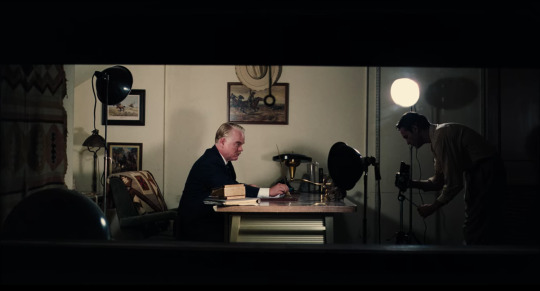
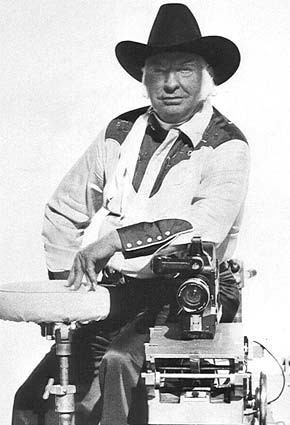
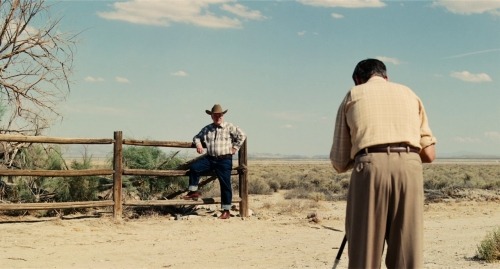
Everyone is gathered at the book event in Phoenix now. Dodd sits in a side room and is visibly nervous. There is a church vibe to the event. The Master (Dodd) comes out on stage to cheers from the crowd. Freddie sits in the middle listening intensely with a yearnful look on his face, perhaps hoping Dodd has a huge secret to reveal. Unfortunately, Dodd just basically says some of the same stuff he’s said before and Freddie looks let down. Anderson’s closeups on Phoenix in shallow depth of field continue to be revealing and look magnificent! Freddie paces afterwards behind the stage, looking lost, angry and confused. As you look at him, his pants, shirt and shoes are way too big. Maybe because he had to borrow some decent clothes from Dodd. Phoenix walks with Freddie’s unusual gait like a wounded clown. A friend of The Cause from New York, Bill, who we’ve seen before, reveals to Freddie he thinks the book stinks. Freddie asks Bill to go outside with him and just completely snaps and slaps Bill hard multiple times. There is something comical about this. It’s as if Freddie’s been holding this monster at bay and then just releases it all on poor ole Bill. Freddie has a history of lashing out at naysayers of The Cause but I don’t believe this is the main reason for the attack. I think Freddie now knows he is not “cured” or “clear” like previously thought. I think the lack of answers he felt he was going to get from Dodd’s speech and book pushed him to this, knowing deep down Dodd doesn’t have all the answers like he expected. In the following scene, Laura Dern’s character sweetly approaches Dodd sitting alone on stage after the event. She confronts him about something he has changed in the book regarding the processing and seems very confused. Dodd has a comically loud, insecure outburst displaying his lack of patience and also his unacceptance of criticism. Obviously, Freddie and Lancaster both simultaneously react harshly when The Cause is questioned despite the contrasting prior exercises practicing non-reactivity.
Freddie Runs
Now Freddie, Lancaster, Clark and Elizabeth drive a car and a motorcycle out to a deserted lake bed. On a personal note, I shot my latest short film’s biggest scene in a lake bed very similar...so similar I had to look it up online to see if it was the same one. It was not. Anyway, I remember in Roger Ebert’s review he seemed to be perplexed by this scene and what it represented. I just think Dodd decided it would be a good idea to get away and blow off some steam with a motorcycle after the stressful book event. I personally really like this scene. It’s funny, it’s visually interesting and there is a danger to it. Dodd explains the game is to pick a point and then drive the motorcycle to that point. Dodd does this first. Now it’s Freddie’s turn. Freddie takes off and speeds away. Dodd does this funny thing in closeup where he puts his hand up to block the sun, watching Freddie ride, then goes to say something, stops himself, then eventually ends up yelling, “Freddie!!” It’s something so small but Hoffman makes it so interesting and humorous and it’s hard to explain why. In my Short Film, I start my scene at this similar location with my hand up looking in the distance, as a nod to this scene with Hoffman (3rd photo).
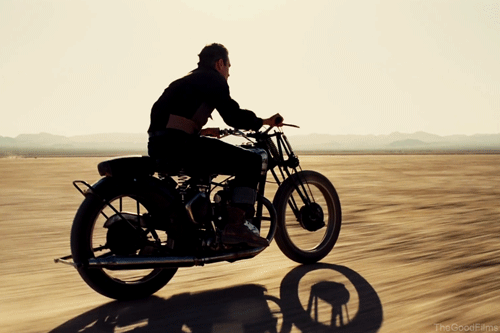
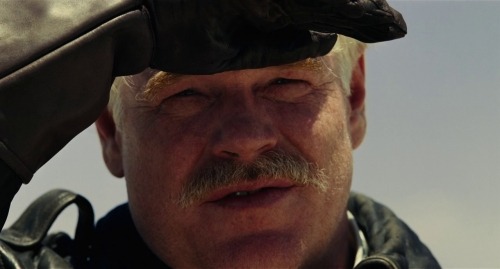

Freddie is long gone with the bike. Dodd’s best friend has left him. “No Other Love” by Joe Stafford comes in perfectly here. It’s such a melancholy end to the scene and I just feel the song compliments it so eloquently. It’s my favorite song of the film because of this and is in the trailer. Freddie goes to the house of the girl he loved before going to the war. He finds out Dorris is married now with kids and lives in Alabama. He finds this out by talking to Dorris’ mother. Freddie missed his shot. The scene is slightly comical due to the dichotomy between the sweet, mannerly mother and Freddie’s pressing roughness and gnarled face. It’s something I always notice and enjoy watching. We are transported now to Freddie asleep alone (most likely drunk) in a movie theater. You can hear Casper the Friendly Ghost in the background and see the flicker of the big screen on the sleeping Freddie and the empty seats around him. There has to be a reason for the choice of Casper the Ghost, but I have no interesting theory why. A theater concierge brings a phone to Freddie after waking him up. It’s Dodd. Either this is a supernatural moment in the film in which Dodd just happens to know where Freddie is (because they’re “tied”) or Freddie is being followed Scientology-style. Freddie nor us know how Dodd knew he was there. This made me think of an interview (somewhere) with PTA saying sometimes details in a film don’t have to make sense or have a definite answer. Dodd asks Freddie to come to England where he currently has a school. He says he misses Freddie and says he can cure him. My guess is he’s had someone find and follow Freddie...unless the Casper the Ghost reference somehow hints at the supernatural spiritual “tie” Dodd mentions between him and Freddie and Dodd just “knew” he was there...but my theory connecting this may be too far of a stretch.
On a Slow Boat to China...
Freddie is once again traveling on a boat, which has become a motif... Freddie adrift. We see the recognizable deep aqua water paired perfectly with Greenwood’s score. The music, once again, adds so much here, producing a sense of longing and beauty.

Freddie arrives at the school looking haggard and gaunt. Jesse Plemons’ character (Dodd’s son) greets him with a wry smile of familiarity which soon turns to concern after examining Freddie’s appearance. They walk down the burgeoning school hallway to Dodd.
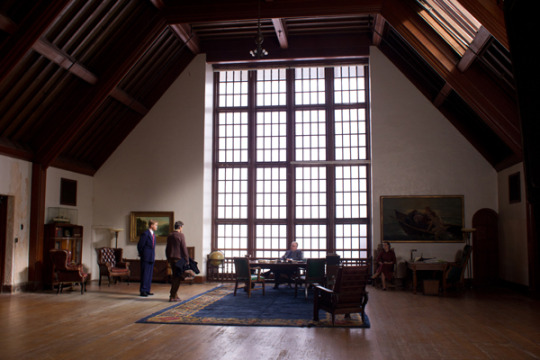
Freddie enters with wild eyes to Dodd’s grand office. Peggy sits off to the side and Dodd at his desk. Freddie hands Dodd some Kool cigarettes and they hug. Peggy immediately asks Freddie if he’s drunk, says he looks sick and says he’s not interested in getting better. She storms out. The two men share a smile after she leaves, but Dodd’s hands are tied. It’s worth mentioning Amy Adams (as Peggy) was also nominated for an Oscar for her role and plays a sort of antagonist to Freddie. Dodd’s book was not well received by close peers and perhaps this was due to Freddie’s influence and she saw this, maybe encouraging Dodd to cut ties because of Freddie’s negative influence and lack of dedication to The Cause. You can see here Dodd loves Freddie very much. This is scene is so good! There is a lot of heart and power here in these closeups. Dodd loves Freddie’s freedom. Freddie depends on Dodd for structure and meaning and a place to stay. Dodd then says my favorite lines of the film, “For if you figure a way to live without serving a master...any master...then let the rest of us know, will you?” With the risk of over-explaining, I’ll dive in with my thoughts... Dodd seems to think everyone has a Master...an obligation, a social role and something transcending mammalian daily life to quench existential and spiritual need. But does Freddie have a Master? I think Dodd thinks if anyone might know how to live without one then it would be Freddie. Would this make Freddie “The Master” and not Dodd? Who is the prophet? Dodd calls him “a man navigating the seas, going wherever he pleases, paying no rent” and you realize Freddie’s steadfast gaze reveals a mastery of something...especially according to Dodd. The culmination here of bringing to consciousness the pair of opposites in character form proves to be the thesis of the film. This is not a film with a traditional story (perhaps that Ebert hoped to understand clearly) but a special situation between two men and how they fit together like puzzle pieces...two sides of the same coin...to the point where one might think it’s possible they did in fact know each another in a past life. Dodd mentions this upon meeting Freddie for the first time and Freddie agrees there is a mutual recognition. Two inverses folding into one another creating something whole, for better or worse. Dodd goes on to explain that he finally figured out where they met in a previous lifetime and says if they meet again in the next life they will be sworn enemies. Again, there is a lovely naivete here...and said with such earnestness. And as mentioned before, it is easy to like Dodd because you believe that he believes what he says, even though we, the audience, are speculative. Again, this is not a film about trying to figure out the legitimacy of a cult but about two men trying to navigate the world the best they can. Dodd goes into great detail about their past life association. In appearance, Dodd is so regal, reserved and groomed...so certain! Freddie is mangled, gaunt and lost. Dodd now begins to sing, which is funny and heart-breaking at the same time. It’s as if this is the best way he knows to express how he feels in the moment. I remember the first time I watched this film in the Laemlle Theatre and there were a few laughs here. I also remember watching this part when I was staying with my Dad and Stepmom one Christmas on HBO. I just flipped through the channels and saw this scene and stopped to watch. My Dad had never seen the film but watched this part with me and also chuckled a bit...not in a “that’s ridiculous” way, but in a concentrated way due to the intensity of Hoffman’s performance here. As the scene carries on, I again begin to wonder if these two really did meet in a previous life. Or maybe it’s just so powerful because they both BELIEVE this past life was real, believing in a pre-destined reason for their association in this lifetime.
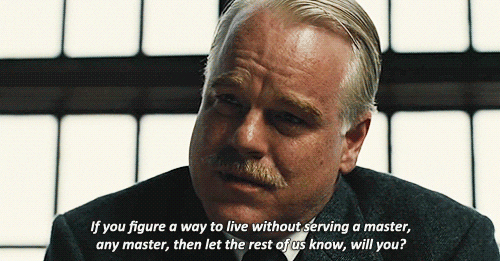
Freddie has now left Dodd. He is out of the office walking alone in a row of trees leaving the school. He goes to a bar, meets an English woman and they go to a room and have sex. Both are fully naked in a very human way lit in natural light. Two hominids in an animalistic act following the parting of Dodd who rejects the animal side for the fully divine. He playfully tells the woman he has to ask her some questions and she can’t blink. The processing scene is obviously still with Freddie and obviously PTA is aware of the power that scene held to call it back. She plays along for a little bit but laughs quickly and breaks. Now waltz music plays, circling back to Freddie on the beach where he was at at the beginning of the film, laying next to the sand woman in oedipal longing. Did he dream all of this?? I have watched the film around 10 times and have never thought about this as much as I have this time around. Of course, it’s ambiguous, but it could very well be true. And he did mention to Dodd in the England office he had a dream, but never got a chance to explain what the dream was. Dodd then went on to talk about their past life association. Anyway...the interpretation that I had come to previously was that Freddie has gone on this journey, but has ended right back where he started, meaning no amount of processing or methods to change his behavior can change his determinism. He is what he is. In fear of repeating this too much (which is never overtly stated in the film) humans cannot escape the fact that they are also of the animal kingdom. I believe the first shot of Freddie in the film mimicing the monkey introduces this idea. And Anderson doesn’t seem to care if the audience gets this first, coded, specific detail, but I believe there are enough clues throughout the film to make the animal comparisons to come to the same interpretation, as I’ve pointed out above multiple times to really bring my point home. Also, Freddie cannot escape how he may have suffered in the war, nor the trauma of his childhood, nor the loss of his sweetheart, Dorris, as he lays next to the breasts of the manufactured woman made of earth as the tide rolls in and out. This is still with him in his memories, shaping his present, whether he deals with it or not. And, more broadly speaking, perhaps all of this striving us humans engage in for self-mastery, and the constant modifications to ourselves to reach some pinnacle of “perfection”, we have built in our own minds is futile. We just go in this big circle, this journey and we end up right where we started. Are we “better”? Are we different? Are we “cured”? Maybe. Maybe not.

To conclude, I’d like to mention that I’ve discovered pre-determination has loomed large in all three films I’ve written about on this page. I’m not sure if it’s me or the films, but it has been the big picture idea I’ve come to on all three. It also makes me think how cinema itself is made possible, by showing and shaping a world, often overtaking the individual characters’ will. I believe this tells us something vital about our reality...cinema expressing transcendent ideas that can swallow up egoic identification, which is why films like this stick with you, pointing to something larger at play within the individual rather than solely the idea we have of ourselves.
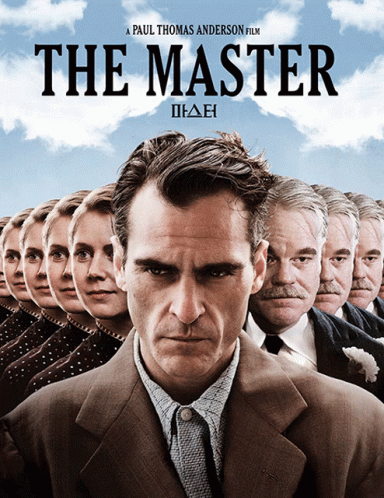
#the master#paul thomas anderson#phillip seymour hoffman#joaquin phoenix#70mm#film analysis#film essay#favorite film#cinema#citizen aycock
0 notes
Text
May 1

..looks like you are drowning..
part one
looks like you are drowning & hope i am wrong. i can see the struggle the turn about in water.
i have done that too pat says that i have paid the price but i wonder
i hope you survive come clean bare your feathers.
fly high
if not i will lay a petal and think of you
as i think of the others that drowned before you that had no feathers
part two,
it looks like you are drowning again shall I jump in to save you and maybe sink myself or shall I wait to see to lay a flower at our feet
part three
maybe you are not drowning really that I made it up and you are dancing like the others
while people die and we lay flowers in memoriam corona
part four
you are floating maybe; I did that for hours went spongy, now face reality and I still think that you are drowning like the others.
-sonja benskin mesher
concrete reasoning
gray day: i am out for a walk when a sidewalk camellia begs myriad questions:
runaway bride?
garden club mishap? rejected proposal? hothouse runaway? centerpiece rebel?
confronted by the unexplained, the human drive to make order from chaos is relentless.
whatever the story, the end is the same: beauty appears and we can only wonder …
with a schedule to keep and no answers at hand i press onward, feeling the inner bloom of nascent gratitude.
-Rich Follett
MF 1
*
Every time I find clay in the garden, beneath a rosebush, say, I find slate too. This is just something I have noticed over the course of a year. It is not necessary to mention these things, especially now, I suppose. I am not happy unless I’m pouring something – tomato feed. I am Philip Levine’s Burial Rights, I recall Bei Dao. These days, I feel the trick to a good carpark, to feel anything, is my proximity to this flower arrangement.
JK 1
*
A story of three fish might be fish bones in a field for birds. Koi feeding, koi feed in a garden centre, at the next junction. Fish bent back over backwards, in blue paint. Scattered to the water’s edge a handful of dirt, to a handful of colour, blue scales at the centre of the field, a water mark, a stone left unturned.
-Alex Mazey
The Life of Petals
We use flowers to mark occasions– Weddings and funerals. The petals linger only briefly, But the sentiment still hangs Heavy in the air, years after Like pollen That settled over and over again On our patio table and chairs, All those long Midwestern summers When heat robbed our lungs of breath. And Wildflowers, not cut-storebought ones, marked a different time, Of an everyday type. Now, cut flowers feel gluttonous to me. And petals bless us with The gentleness of how life ought to be.
https://thewombwellrainbow.files.wordpress.com/2020/05/petals.m4a
-st
Utopia Burning
Warnings ignored from many a social self appointed warlord Echoes of dissident discord striking a high-pitched off key note As hungry flames lick and lash causing an apocalyptic molten urban and suburban foretold mess Whispered by familiar oracles their verbal miracles documenting their fiery cautionary chronicles Of systems slowly imploding temperaments exploding fake veneers and smiles exfoliating as ignorant masses squawk for a helping hand from those witnessing their demise and burning squirming shedding acid tears for Utopia burning…
https://thewombwellrainbow.files.wordpress.com/2020/04/utopia-burning-mp3.mp3
© Don Beukes
Still Silent
No sound, water jelly flat, so still it hurts my ears. Even sun slides silently into autumn’s metal light.
All jamboree, clang and din now far away in time. Even breath is offensive here, in case of ripple and slapping rocks.
I cannot read or turn a page lest a mumble or paper scrape, escape and shatter the loch. Like a breaking glass to a rousing cheer, as all that knowledge gets out.
So I stare at reflections in late day waters reliable quiet, but maybe their heat is not that hot.
https://thewombwellrainbow.files.wordpress.com/2020/04/still-silent.m4a
©️ Dai Fry 30th April 2020.
The sweet flower’s heart Wilting on the cold, hard slab My love’s final gift
-Carrie Ann Golden
Camellia
You lay beautiful and gasping alone on Tithonian stone. A sudden fall from grace, petal broken angel: forage for sweeper winds.
Transient as summer days. Temperate these forevers soon fade to winter grey. Dog-day memories cannot abide short-day cold.
What are you, I wonder? A love certified in Bacchus’s dance or a loved one certified and boxed in tears and brown ale.
https://thewombwellrainbow.files.wordpress.com/2020/04/camellia.m4a
©️ Dai Fry 30th March 2020.
The giant fish takes back the myth
The morning before she was to become a story the sea was baited quiet, the kind that silks
all desire down to swish. To decide to leap from one cool world to another just for breakfast
is to bare your colours to the scaling knife of the wind, and she did – her fireback beacon launched
for the brief protein of flying legs. How often we fail to see that dark hull waiting, we beasts so full up
with the rush of living for our risks. And the shape of the poised hero held no meaning, to a fish
but oh the shimmerhook, like all the moons her eye’s nightcoin had ever purchased
from deep beneath the water, and there is the lust, the swish- -and want. The glowworm crescent to silver her belly.
We all want to shine in fullness. Only heroes are given names in these stories.
For her need she was translated into an island, and I am running the delicate gasp of her jaws
in the shape of this coast, forever straining for the hook and still called only fish
even with all we have made of her. Every time I desire to transcend my quiet water, I forget the heroes
and leap from her skin, and hope that landing empty
but with one eye fixed on the moon every night after this will be enough.
-Ankh Spice
Beheaded Camelia’s
delicate red petals last longer on the less travelled path. Flash of disappearing red lace, paper thin survival. Unbroken in bright sunlight, bright on grey stone. Destruction stays at home to avoid destruction.
The red wing is allowed space to revolve reflect in water. “Temporary” like the word “soon”, a duration undecided.
-Paul Brookes
Bios and Links
-Alex Mazey
(b.1991) received his MA (distinction) from Keele University in 2017. He later won The Roy Fisher Prize for Poetry with his debut pamphlet, ‘Bread and Salt’ (Flarestack, TBA). He was also the recipient of a Creative Future Writers’ Award in 2019. His poetry has featured regularly in anthologies and literary press magazines, most notably in The London Magazine. His collection of essays, ‘Living in Disneyland’, will be available from Broken Sleep Books in October 2020. Alex spent 2018 as a resident of The People’s Republic of China, where he taught the English Language in a school run by the Ministry of Education. His writing has been described as ‘wry and knowing,’ with ‘an edge that tears rather than cuts or deals blows.’
Twitter: @AlexzanderMazey
Instagram: alexmazey
Here is my interview of Alex:
https://thewombwellrainbow.com/2018/12/18/wombwell-rainbow-interviews-alex-mazey/
-Rich Follett
is a High School English and Creative Writing teacher who has been writing poems and songs for more than forty years. His poems have been featured in numerous online and print journals, including BlazeVox, The Montucky Review, Paraphilia, Leaf Garden Press and the late Felino Soriano’s CounterExample Poetics, for which he was a featured artist. Three volumes of poetry, Responsorials (with Constance Stadler), Silence, Inhabited, and Human &c. are available through NeoPoiesis Press (www.neopoiesispress.com.)
As a singer-songwriter, Rich has released five albums of independent contemporary folk music. His latest. Somewhere in the Stars, is available at http://www.richfollett.com. He lives with his wife Mary Ruth Alred Follett in the Shenandoah Valley of Virginia, where he also pursues his interests as a professional actor, playwright, and director.
-Ankh Spice
is a sea-obsessed poet from Aotearoa (NZ). His poetry has appeared in a wide range of international publications and has twice been nominated for the Pushcart Prize. He truly believes that words have the power to change the place we’re in, and you’ll find him doing his best to prove it on
Twitter: @SeaGoatScreams or on Facebook: @AnkhSpiceSeaGoatScreamsPoetry
-Carrie Ann Golden
is a deafblind writer from the mystical Adirondack Mountains now living on a farmstead in northeastern North Dakota. She writes dark fiction and poetry. Her work has been published in places like Piker Press, Edify Fiction, Doll Hospital Journal, The Hungry Chimera, GFT Press, Asylum Ink, and Visual Verse.
-Anjum Wasir Dar
Born in Srinagar (Indian occupied Kashmir) in 1949. My family opted for and migrated to Pakistan after the (1947)Partition of India. Educated in St Anne’s Presentation Convent Rawalpindi.Graduated with Distinction in English Lang. & Literature in 1968 from the Punjab University. Won the All Round Best Student Cup.1968. Obtained a Masters Degree in English Literature/American Studies Punjab University P.G. Diploma in TEFL from Allama Iqbal Open University Islamabad and a CPE from Cambridge University UK (LSE British Council)1991 Developing Educators in Pakistan Training Course sponsored by IFC & Bradford University 1999.Bronze Medal Poet of Merit Award by International Society of Poets & http://Poetry.com USA 2000 7 Times Winner NANOWRIMO, (National Novel Writing Month) Adventure Novel ‘ The Adventures of the Multi Colored Lead People’ in the printing process. Educator Writer since 1990 Editor College Magazine Creative Writer English at Channel 7 Pvt Ltd Islamabad.National Education Award Winner 1998 for Research & Publications.
-sonja benskin mesher
born , Bournemouth.
now
lives and works in North Wales as an independent artist
‘i am a multidisciplinary artist, crafting paint, charcoal, words and whatever comes to hand, to explain ideas and issues
words have not come easily. I draw on experience, remember and write. speak of a small life’.
Elected as a member of the Royal Cambrian Academy and the United Artists Society The work has been in solo exhibitions through Wales and England, and in selected and solo worldwide. Much of the work is now in both private, and public collections, and has been featured in several television documentaries, radio programmes and magazines.
Here is my interview of sonja benskin mesher:
https://thewombwellrainbow.com/2018/10/16/wombwell-rainbow-interviews-sonja-benskin-mesher/
-Samantha Terrell
is an American poet whose work emphasizes emotional integrity and social justice. She is the author of several eBooks including, Learning from Pompeii, Coffee for Neanderthals, Disgracing Lady Justice and others, available on smashwords.com and its affiliates.Chapbook: Ebola (West Chester University Poetry Center, 2014)
Website: poetrybysamantha.weebly.com Twitter: @honestypoetry
Here is my 2020 interview of her:
https://thewombwellrainbow.com/2020/04/08/wombwell-rainbow-interviews-samantha-terrell/
-Don Beukes
is a South African and British writer. He is the author of ‘The Salamander Chronicles’ (CTU) and ‘Icarus Rising-Volume 1’ (ABP), an ekphrastic collection. He taught English and Geography in both South Africa and the UK. His poetry has been anthologized in numerous collections and translated into Afrikaans, Persian, French and Albanian. He was nominated by Roxana Nastase, editor of Scarlet Leaf Review for the ‘Best of the Net’ in 2017 as well as the Pushcart Poetry Prize (USA) in 2016. He was published in his first SA Anthology ‘In Pursuit of Poetic Perfection’ in 2018 (Libbo Publishers) and his second ‘Cape Sounds’ in 2019 (Gavin Joachims Publishing). He is also an amateur photographer and his debut Photographic publication appeared in Spirit Fire Review in June 2019. His new book, ‘Sic Transit Gloria Mundi’/Thus Passes the Glory of this World’ is due to be published by Concrete Mist Press.
Here is my interview of Don Beukes:
https://thewombwellrainbow.com/2019/11/02/wombwell-rainbow-interviews-don-beukes/
-Dai-Fry
is an x social worker and a present poet. Image is all but flow is good too. So many interesting things… Published in Black bough Poetry, Re-Side, The Hellebore, The Pangolin Review. He will not stop.
Twitter @thnargg
Web. seekingthedarklight.co.uk
Audio/Visual. @IntPoetryCircle #InternationalPoetryCircle Twitter #TopTweetTuesday
-Paul Brookes
is a shop asst. Lives in a cat house full of teddy bears. His chapbooks include The Fabulous Invention Of Barnsley, (Dearne Community Arts, 1993). The Headpoke and Firewedding (Alien Buddha Press, 2017), A World Where and She Needs That Edge (Nixes Mate Press, 2017, 2018) The Spermbot Blues (OpPRESS, 2017), Port Of Souls (Alien Buddha Press, 2018), Please Take Change (Cyberwit.net, 2018), Stubborn Sod, with Marcel Herms (artist) (Alien Buddha Press, 2019), As Folk Over Yonder ( Afterworld Books, 2019). Forthcoming Khoshhali with Hiva Moazed (artist), Our Ghost’s Holiday (Final book of threesome “A Pagan’s Year”) . He is a contributing writer of Literati Magazine and Editor of Wombwell Rainbow Interviews.
-Mary Frances
is an artist and writer based in the UK. She takes a few photos every day, for inspiration and to use in her work. The images for this project were all taken in the last two years on walks during in the month of May. Her words and images have been published by Penteract Press, Metambesen, Ice Floe Press, Burning House Press, Inside the Outside, Luvina Rivista Literaria, and Lone Women in Flashes of Wilderness. Twitter: @maryfrancesness
-James Knight
is an experimental poet and digital artist. His books include Void Voices (Hesterglock Press) and Self Portrait by Night (Sampson Low). His visual poems have been published in several places, including the Penteract Press anthology Reflections and Temporary Spaces (Pamenar Press). Chimera, a book of visual poems, is due from Penteract Press in July 2020.
Website: thebirdking.com.
Twitter: @badbadpoet
Here is my interview of James Knight:
https://thewombwellrainbow.com/2019/01/06/wombwell-rainbow-interviews-james-knight/
Welcome to a special ekphrastic challenge for May. Artworks from Mary Frances, James Knight and Sue Harpham will be the inspiration for writers, Alex Mazey, Ankh Spice, Anjum Wasim Dar, James Knight, Samantha Terrell, Dai Fry, Carrie Ann Golden, sonja menskin mesher, Rich Follett, Don Beukes and myself. May 1st. May 1 ..looks like you are drowning.. part one looks like you are drowning & hope i am wrong.
0 notes
Text
The Weekend Warrior Jan. 17, 2020 - WEATHERING WITH YOU, BAD BOYS FOR LIFE, DOLITTLE
Only the second column of the year, and I’m already questioning how long I’m going to keep writing this. In case you haven’t heard, I’m no longer writing for The Beat. I don’t really want to talk about it, but it was generally a horrible experience that I put up with since I needed the work/money. It turns out that someone I thought I knew, someone I respected and considered a friend for almost a quarter of a century, turned out to be a truly awful person. That’s really all I’m going to say... for now. (The Beat decided not to run my final Box Office Preview, so that’s incorporated within, as well.)
The good news is that Makoto Shinkai’s latest animated film, WEATHERING WITH YOU (GKIDS), will hit U.S. theaters this Friday after a few “fan previews” on Weds and Thursday night. If you don’t know the name of that Japanese animation filmmaker then you clearly didn’t see the fantastic sci-fi film Your Name, which was an absolutely enormous hit, grossing $354 million worldwide, most of that in Japan, China and South Korea in 2016. That movie eventually opened in North America in 2017 and made another $5 million, but it’s probably one of my favorite animated films. (Your Name will be playing again at the Metrograph starting February 7 if you haven’t seen it.)
But back to Weathering with You, which is another wonderful film from Makoto-san, this one about a high school senior named Hodaka who runs off to Tokyo and runs into financial problems in the gloomy city (boy, can I relate) until he meets Hina, an optimistic girl who has the ability to stop the rain and clear the clouds, something that they turn into a thriving business. It’s a simpler premise than Your Name for sure, but it’s still steeped in magic and fantasy that really makes it a very special film.
You can get tickets for Weathering with You here.

BAD BOYS FOR LIFE (Sony)
Cast: Will Smith, Martin Lawrence, Alexander Ludwig, Joe Pantoliano, Paola Nuñez, Kate Del Castilo, DJ Khaled Directed By: Adil El Arbi and Bilall Fallah (Black, Gangsta, Image) MPAA Rating: R
Oddly, it took three whole weeks to get our first sequel of 2020 – that is, if you don’t count The Grudge, which actually is a sequel. I guess that would make Bad Boys for Life the first sequel that people actually may want to see, because it reunites Will Smith and Martin Lawrence, the stars of two very popular buddy cop movies a nd two of the biggest stars of the ‘90s.
The first Bad Boys came out in 1995 when both guys were pretty big TV stars, Lawrence on Fox show Martin and Smith from The Fresh Prince of Bel-Air. Oddly, Lawrence already had quite a bit of film success from the “House Party” movies and Eddie Murphy’s Boomerang when he was paired with Smith.When the original Bad Boys opened with $15.5 million and grossed $65.6 million, that was considered pretty good for the time, especially for first-time director Michael Bay. That’s right. Bad Boyswas also Bay’s debut.
Ever since then, things have gotten crazy, especially for Smith, who starred in Roland Emmerich’s blockbuster Independence Day just one year later, the first Men in Black the year after that, and the rest is history. Lawrence went on to a couple big movies of his own, including the copycat Blue Streak, but other than 2000’s Big Momma’s Houseand its sequel six years later, he just didn’t have much draw when he tried other things. 2011’s Big Mommas: Like Father, Like Son made about half what its predecessor made (about $38) million and then Lawrence vanished for a while.
Smith and Lawrence reunited for 2003’s Bad Boys II, again with Bay, who was also a much bigger director by then (and that was even before the “Transformers” movies) and that opened with $46.6 million and grossed $138.5 million domestically, showing how much bigger both stars had become.
That brings us to Bad Boys for Life, the third movie that may or may not have quite the same audience as the last movie. Little-known Belgian directors Adil El Arbi and Bilall Fallah take over from Michael Bay for this threequel, and oddly, it’s Smith’s fourth movie in the past year after the disappointing showing for Ang Lee’s Gemini Man and the animated Spies in Disguise over the holidays. On the other hand, Smith also had a huge hit last summer with Disney’s Aladdin,and that seemed to be enough to appease his fans who had gotten used to him doing one movie a year.
In some ways, Bad Boys for Life might feel a little like Men in Black 3, which Sony Pictures released in the summer of 2012, just nine years after the previous movie’s $190 million. While it didn’t seem like a necessary sequel, the third Men in Blackstill made only a little bit less. Obviously, nine years wasn’t enough to sour anyone on Smith’s character, although that movie also was now eight years ago, and we’re coming off a year of a ton of disappointing sequels.
Oddly, the MLK Jr. weekend has become a prime weekend for buddy cop movies, two of them seemingly inspired by the “Bad Boys” movies, as Ice Cube and Kevin Hart teamed up for Ride Along and its sequel. Both of them opened this weekend, the original six years ago to $48.6 million over the four-day weekend, and its sequel two years later made $41 million over the extended weekend.
That would seem like a pretty good barometer for Bad Boys for Life, if not for the fact that it’s a sequel to a movie that came out 16 years ago with a much hotter blockbuster director. Will audiences who were 18, 19, 20 when Bad Boys 2come out be anywhere near as interested in Smith and Lawrence’s shenanigans now that they’re well into their 30s?
Reportedly, Bad Boys for Life cost $90 million, although it’s doubtful that Sony expects the movie to make all of that money domestically. Bad Boys II made almost the exact same amount overseas than in North America, although the international market has exploded in the 15 years since then.
Reviews will probably hit around the same time that this column goes live or maybe slightly earlier, so it might be hard to tell if there’s a consensus either for or (more likely) against it. (It’s a sequel being released in January. Do you REALLY think that critics are gonna give it a fair shake?)
That just leaves the question of how well Bad Boys for Life might do, considering that Bay isn’t involved and Lawrence hasn’t been in the public eye very much. I think Smith’s ongoing popularity and the number fans of the previous movies should help the movie make close to $40 million over the four-day weekend, give or take. It certainly will offer something new for the key 20-to-40 year old males that already saw 1917.

DOLITTLE (Universal)
Cast: Robert Downey Jr., Ralph Ineson, Michael Sheen, Antonio Banderas, Carmel Laniado, Jim Broadbent, Jessie Buckley with the voices of Emma Thompson, Rami Malek, John Cena, Craig Robinson, Kumail Nanjiani, Octavia Spencer, Ralph Fiennes, Selena Gomez and more Directed By: Stephen Gaghan (Syriana, Gold) MPAA Rating: PG
Next, we have a slightly oddball of a first new family film for the year, as well as Robert Downey Jr’s first non-Marvel movie in a very long time, playing the classic kids book hero Doctor Dolittle, a doctor who can talk to animals. The children’s books by Hugh Lofting originated all the way back in 1920, and it was only eight years later before it was adapted into a silent animated short film. Probably the most famous movie (at least for 30 years) was the 1967 version of the movie starring Rex Harrison, but Eddie Murphy took on the role in 1998 for two hit movies released by 20th Century Fox (so maybe we’ll see them on Disney+ soon?).
Which might make you wonder how Universal got its hands on the property and why the studio isn’t making it a bigger deal about 2020 being the 100thanniversary of the character? Well, kids, it’s something called “public domain,” which allows anyone who wants to make a movie based on the character to do so. In this case, it’s Oscar-nominated filmmaker Stephen Gaghan, best known for his political thriller, Syriana, which got George Clooney his first Oscar. Obviously, a family-friendly fantasy adventure seems like an odd choice, but obviously, this is a real movie.
The story involves Dolittle being called to save Queen Victoria (played by the wonderful Jessie Buckley, star of Wild Rose) who is dying. Dolittle brings along a young lad named Stubbins (Harry Collett from Dunkirk) as well as a slew of animals voiced by a menagerie of actors. We’ll get back to them in a bit.
Obviously, Downey’s presence will probably play a larger part in anyone’s interest in the movie, since I’m not sure Doctor Dolittle has been able to maintain any sort of place in the pantheon of popular children’s book characters among younger readers. (I could be wrong.) This movie is co-produced by Joe Roth, who helped pave the way for big stars to take on popular fantasy characters, putting Johnny Depp in one of Disney’s bigger pre-Marvel/Lucasfilm hits, Tim Burton’s Alice in Wonderland, James Franco in Sam Raimi’s Oz the Great and Powerful, and Angelina Jolie in Maleficent. Universal (who previously teamed with Roth for Snow White and the Huntsmanin 2012 and its less successful sequel) are hoping that Downey can bring a similar starpower to Dolittleto get people into theaters.
The last time Downey took on a non-Marvel literary character was his eponymous turn as Sherlock Holmes in the movie directed by Guy Ritchie just over ten years ago. That made a half a billion worldwide, and its sequel two years later did similar business. Other than a starring role in Todd Phillips’ Due Date and the passion project The Judge with Robert Duvall, Downey hasn’t done much outside the MCU. But why should he? Apparently, he is getting somewhere around $50 million to make each of those movies, and for most people, that’s early retirement money, especially after wrapping up the role inAvengers: Endgame, the highest-grossing blockbuster of all time (globally). And yet, we’ll supposedly be seeing Downey’s Tony Stark in this year’s Black Widow, probably in flashback, so he’s clearly not putting the rest of his career in the hands of playing Doctor Dolittle.
The rest of the cast might not be as important but the movie does star the popular actor Michael Sheen (Good Omens), Antonio Banderas (who just received his first Oscar nomination earlier this week) and then the voices include a strange mix of British and American actors, includingEmma Thompson, Rami Malek, John Cena, Craig Robinson,Kumail Nanjiani, Octavia Spencer, Ralph Fiennes, Selena Gomez and more. It’s kind of a shame they couldn’t find a role for Kevin Bacon, as it would make that “Six Degrees of Kevin Bacon” game so much easier.
Family movies have generally been tough to predict, especially ones that may or may not interest teen and/or older audiences, which is certainly the case here. Opening Dolittle on a weekend with no school on Monday is a wise move by Universal, as well as doing so in January where there isn’t as much competition for eyes. More than anything, Dolittle will be a very good (and possibly sobering) test on whether Downey is a box office star when not playing Tony Stark… or Sherlock Holmes.
The movie has not caught the attention or interest of the ever-outraged #FilmTwitter, except to make fun of it, but that doesn’t mean younger kids won’t want to see a fun adventure with talking animals, and the latter should help Dolittle make somewhere between $25 and $28 million over the four-day weekend.
This Week’s Box Office Predictions:
Despite the impressive opening for Sam Mendes’ 1917 last weekend and its ten Oscar nominations, it’s very likely that either Bad Boys for Life or Dolittle (or both) will knock it out of first place this weekend. It definitely could be a close race for second place, depending on how well the latest movies from superstars Will Smith and Robert Downey are received. Expect Greta Gerwig’s Little Women to also get a nice bump from its own Best Picture nomination this weekend.
(Note: All the numbers below are for the four-day holiday weekend.)
Bad Boys for Life (Sony) - $42.5 million N/A (up $4 million)*
1917 (Universal) - $29.5 million -20%
Dolittle (Universal) - $23.5 million N/A (down $3.5 million)*
Jumanji: The Next Level (Sony) - $12 million -15%
Star Wars: The Rise of Skywalker (Lucasfilm/Disney) - $9.5 million -38%
Just Mercy (Warner Bros.) - $9 million -7%
Like a Boss (Paramount) - $7.5 -25%
Little Women (Sony) - $6.6 million -15%
Knives Out (Lionsgate) - $4.6 million -18%
Frozen II (Disney) - $4.5 million -24%
*UPDATE: Okay, my earlier predictions may have been a little unrealistic and it’s pretty clear that Bad Boys for Life, which has gotten decent reviews, will do significantly better than Dolittle, despite there not being much family competition. I’m adjusting accordingly.
LIMITED RELEASES
Besides Weathering with You, Tim Robbins and Susan Sarandon’s kid (well, he’s 30) Jack Henry Robbins’ movie VHYES (Oscilloscope) will be out in select theaters and presumably VOD sometime soon. It’s a fairly odd movie made up of bits recorded on a VHS camera meant to look like it was recorded off various television stations by a teen, which includes bits of “late night adult television.” It’s pretty amusing more for appearances by the likes of Kerri Kenney and Thomas Lennon from “Reno 911,” Mark Proksh from “What We Do in the Shadows,” Charlyne Yi and more. It will open in select theaters Friday, including the Alamo Drafthouse in Brooklyn. It has some funny moments but it’s a little disjointed; I’m sure it would be great in an environment that involves drinking.
Also on the genre side of things is Gille Klabin’s directorial debut The Wave (Epic Pictures), starring Justin Long and Donald Faison, a weird movie in which Long plays an insurance lawyer who goes out on the town with his co-worker (Faison) but then gets dosed with a hallucinogen. It will open in select cities and On Demand Friday.
Alex (Taxi to the Dark Side) Gibney’s latest doc Citizen K (Greenwich) will open at the Film Forum on Wednesday, this one looking at Mikhail Khodorkovsky, the wealthiest man in Russia who was valued at $15 billion from his Siberian oil before being thrown into jail by Putin. I haven’t seen the movie, but it recently received a nomination from the Writers Guild (WGA).
A couple mostly VOD horror films out on Friday are Pedro C. Alonso’s horror/thriller Feedback (Blue Fox Entertainment), starring Eddie Marsan, Paul Anderson and Ivana Baquero (Pan’s Labyrinth) and Andy Newberry’s The Host (Vertical Entertainment), starring Maryam Hassouni, Mike Beckingham, and Dougie Poynter.
REPERTORY
Before we get to the regular stuff, if you happen to have some free time on Saturday, like the whole day, you should get down to the Anthology Film Archives for Subway Cinema’s latest all-day marathon, “It’s the Nineties, Stupid!” a collection of six rare and probably very weird films from the ‘90s shown on 35mm. These events are always a lot of fun, and there may still be some tickets left if you act quickly.
METROGRAPH (NYC):
Welcome To Metrograph: Reduxcontinues this weekend with Seizun Suzuki’s Branded to Kill (1967) and Edward Yang’s A Brighter Summer Day (1991). I personally haven’t seen either but might give one or more a try.This weekend’s Late Nites at Metrograph is Paul Schrader’s 1985 movie Mishima: A Life in Four Chapters, a movie I’m not really familiar but apparently, it stars Ken Ogata as Japanese artist Yukio Mishima, who committed seppuku. This weekend’s Playtime: Family Matinees is the classic sci-fi film Them!(1954).
ALAMO DRAFTHOUSE BROOKLYN (NYC)
Next Monday’s “Fist City” screening is Wesley Snipe’s Passenger 57 (1992), the “Terror Tuesday” is Adam Wingard’s 2014 movie The Guest, starring Dan Stevens, with Wingard in person for a QnA, and then next week’s “Weird Wednesday,” January 22, is the 1990 film Brain Dead, starring Bills Paxton and Pullman, hosted by YOURS TRULY!! Yes, I’m making my Alamo debut with a movie from the ‘90s I absolutely loved.
THE NEW BEVERLY (L.A.):
Today’s “Afternoon Classics” matinee is John Huston’s The African Queen (1951), while Friday’s “Freaky Fridays” is the 1985 horror film, Silver Bullet. Friday night’s midnight offering is Tarantino’s Django Unchained while Saturday’s midnight movie is Scorsese’s Raging Bull, celebrating its 40th anniversary this year. The weekend “Kiddee Matinee” is Miyazaki’s Kiki’s Delivery Service (1989).
FILM FORUM (NYC):
The West Village theater begins an expansive new series called “Black Women: Trailblazing African American Actresses 1920-2001” on Friday, and it’s fairly self-explanatory except that there are a lot of films that have rarely been seen in recent years, such as Otto Preminger’s 1954 film Carmen Jones, starring Dorothy Dandridge; Vincente Minelli’s 1943 film Cabin in the Sky with Ethel Waters and Lena Horne, and even Pam Grier as Coffy in Jack Hill’s 1973 film. This is going to be a very special series, one unlike anything else that’s been done on the New York rep scene, and I wish I could afford to check some of these movies out. As part of the series, “Film Forum Jr.” will play the 1972 movie Sounder, for which Cicely Tyson received an Oscar nomination.
EGYPTIAN THEATRE (LA):
On Friday, Beyond Fest presents a 35mm print of the 1993 movie Freaked with directors Alex Winter and Tom Stern and most of the cast and many of the crew in attendance. Hosted by my pal, Drew McWeeney! On Saturday, there’s a matinee of Disney’s 20,000 Leagues Under the Sea (1954) and then that night is a double feature of Marlon Brando’s One Eyed Jacks (1961) and Peter Fonda’s The Hired Hand (1971). Sunday Print Edition is a matinee of 1945’s Hangover Square, then later on Sunday is the first Sean Connery Bond film, Doctor No (1962). Sunday night is a screening of Hitchcock’s Rear Window (1954).
AERO (LA):
On Weds. night, Greg Proops is presenting the hilarious Barbara Streisand-Ryan O’Neal comedy What’s Up, Doc? (1972) as part of his monthly film club. On Thursday the 16th, the Aero is showing Raging Bull in a matinee as part of its “Films of Marty and Bob,” then Friday is the 15thannual Focus on Female Directors, a mix of older and newer movies including the recently nominated short, Kitbull. Saturday begins “A Tribute to Noah Baumbach” with a double feature on Saturday night of Frances Haand Mistress America, his two collaborations with Greta Gerwig. Sunday is a double feature of his earlier films The Squid and the Whale and Kicking and Screaming. Tuesday’s offering in “The Films of Marty and Bob” is the classic King of Comedy, one of my favorite collaborations between the duo.
QUAD CINEMA (NYC):
On Friday, the Quad begins the series “Origin Stories: Bertrand Bonello’s Footnotes to Zombi Child” aka Bonello’s new movie, which opens next Friday. This series will include lots of genre films that influenced the film,including Carpenter’s The Serpent and the Rainbow, De Palma’s Carrie, The Exorcist: Extended Director’s Cut, I Walked with a Zombie and the Aussie classic, Picnic at Hanging Rock (also a director’s cut).
MOMA (NYC):
This week’s Modern Matinees: Jack Lemmonare Billy Wilder’s Oscar-winning The Apartment (1960) with Shirley MacLaine, the 1955 film Mister Roberts Thursday, and Costa-Gravas’ 1982 film Missing on Friday. Also, the International Teen Cinema series Show Me Love continues through Sunday. (You can click on the link to see what’s playing.) Another series, To Save and Project, the 17thMOMA International Festival of Film Preservation will run through the weekend and next week with some interesting choices like Roger Corman’s The Masque of the Red Death (1964) and Mystery of the Wax Museum from 1933.
FILM AT LINCOLN CENTER (NYC):
Although most of the screens here will be taken up by the 2020 New York Jewish Film Festival (see below), but FilmLinc is also getting a head start on its annual “Film Comment Selects” with the New York premiere of Jeffrey Peixoto’s Over the Rainbow and a 35mm screening of Darren Aronofksy’s controversial 2017 film mother!, starring Jennifer Lawrence. Okay, neither are that old but still sort of repertory.
IFC CENTER (NYC)
“The Films of Studio Ghibli” ends on Thursday, so it might be your last chance to see many of these films theatrically before they move to HBO Max later this year. Otherwise, it’s most of the same movies screening at midnight: David Lynch’s Eraserhead and Mulholland Drive, as well as James Cameron’s The Terminator. Ah! Looks like the IFC Center added its new winter repertory series after I wrote this week’s column. Weekend Classics: Luis Buñuel will screen the filmmaker’s 1972 film The Discreet Charm of the Bourgeoise, The Terminator (1984) is screening as part of Waverly Midnights: Hindsight is 2020s, and Late Night Favorites: Winter 2020 is Kubrick’s The Shining (1980) but ALSO Prince’s 1984 classic, Purple Rain.
MUSEUM OF THE MOVING IMAGE (NYC):
As part of the exhibition “Envisioning 2001: Stanley Kubrick’s Space Odysey,” MOMI will have a screening of Stanley Kubrick’s film on Saturday afternoon with actor Dan Richter appearing in person. (For $25, you can get access to the exhibition after the screening.)
ROXY CINEMA (NYC)
The love for Nicolas Cage continues as the Roxy will screen Brian De Palma’s Snake Eyes (1998) on Wednesday and Saturday, and Joel Schumacher’s 1999 film 8mm on Thursday.
LANDMARK THEATRES NUART (LA):
This Friday’s midnight offering is Pink Floyd’s The Wall (1982) by filmmaker Alan Parker.
FILM FESTIVALS
Going back to Film at Lincoln Center’s 29thAnnual New York Jewish Film Festival – which I oddly have NEVER attended (mainly since I don’t have an outlet to write about it) – it begins on Wednesday with the New York premiere of the doc Picture of his Life, about underwater photographer Amos Nachoum. It will run through the end of the month, closing on Jan. 28 with the New York premiere of Dror Zahavi’s Crescendo about a world-famous conductor, and the Centerpiece selection is Marceline Loridan-Ivens’ 2003 film The Birch Tree Meadow. I’m not really sure why I haven’t gotten to more of the films in this festival, but it’s mainly because it offers so much, and I never know what’s good or bad and what’s worth my time, which is kind of a shame.
STREAMING AND CABLE
Okay, it’s a little funny that media mogul Tyler Perry is making his transition to Netflix with a film called TYLER PERRY’S A FALL FROM GRACE on Friday, and unlike most of Perry’s movies, I was invited to a press screening, which I sadly couldn’t make since I have to see Bad Boys for Life. It’s about a young woman named Grace (Crystal Fox) who confesses to killing her husband so her lawyer needs to learn the truth.
I also haven’t been able to watch the Viola Davis-McKenna Grace dramedy Troop Zero from filmmakers named “Bert & Bertie” but it will premiere on Amazon Prime this Friday. It also stars Oscar-winner Allison Janney and Jim Gaffigan, but it takes place in 1977 Georgia where a young girl (Grace) dreams of going to space by being recorded on NASA’s Golden Record.
Next week, we get The Gentlemen (STXfilms), the latest ensemble crime movie from Guy Ritchie, which I’m really excited about, and the horror/thriller The Turning (Universal). Again, I’m not really sure if I’m going to be writing anything more after this.
0 notes
Text
His Dark Materials: Who is Mrs. Coulter?
https://ift.tt/2O86XOy
His Dark Materials Episode 2 shows a different side to Mrs. Coulter. Ruth Wilson explains the key to understanding her character. Spoilers
facebook
twitter
tumblr
This His Dark Materials article contains spoilers through Episode 2.
“I feel like Mrs Coulter is a bit of a control freak,” says Ruth Wilson on stage at the London premiere of His Dark Materials. “She needs to be in control, and that’s in her look as much as everything else.”
Mrs. Coulter’s look in the HBO-BBC adaptation is a striking one. Inspired by 1930s-1940s Hollywood actor Hedy Lamarr, it oozes glamour and shine. Wilson’s costumes feature bold tailoring in luxurious velvet, satin and fur, with jeweled accents. They’re clothes that assert her character’s wealth and status while accentuating her physical attractiveness – a source of power she deliberately exploits in the male-dominated spheres in which she operates.
Operates is the word for it; Mrs. Coulter’s actions are surgeon-precise. An intelligent and skilled manipulator, she calculates exactly what to do, say, and—yes—wear to achieve her ambitions. Those clothes, for instance - they’re not just designed to look chic, but also to serve a dreadful purpose. They are, after all, what first attracts Lyra to her at Jordan College.
read more: His Dark Materials Review (Spoiler-Free)
“I wanted her to be soft,” explains Wilson. “I wanted fluffy, touchable hair. We talked about the clothes being tactile, so velvets and satins and sparkly for children. I wanted her to be approachable to children,” she laughs. “Well, she’s got to attract kids!”
After His Dark Materials Episode 2, viewers know why. Mrs. Coulter is the head of the General Oblation Board (oblation means an offering to God), an organization whose initials have led to it being mythologized among the Gyptian children as child-abductors "The Gobblers."
Funded by the tyrannical religious ruling authority the Magisterium, the board has been kidnapping children and is preparing to take them North for a series of dark experiments. In Episode 2, Mrs. Coulter visits the imprisoned children in her fairy godmother guise, taking down their letters home and promising them an adventure to “the best place you could possibly go to.” Once out of sight, she drops the façade, burns the letters and strides away, a conscienceless aberration in a glossy dress.
Mrs. Coulter’s daemon mirrors her clothing. A golden monkey with shining, soft fur, on the outside he’s exactly the kind of animal a child might be drawn towards. On the inside though… well, that’s the question. Nameless and voiceless, Mrs Coulter’s daemon is a very different prospect to most.
read more: His Dark Materials Creator Discusses Religion in TV Show
“Everyone’s character has that interesting relationship [with their daemon] but hers is really quite specific,” says Wilson. “My daemon doesn’t have a name and it doesn’t speak, so I have a different relationship to everyone else. I can also separate from my monkey, or from my daemon.”
Viewers found that out in Episode 2, when Lyra and Pan discovered that the golden monkey had been spying on them through Lyra’s bedroom grille independently of Mrs. Coulter (usually, daemons can’t stray more than a few yards from their human without causing intense discomfort to both).
Wilson explored what this extraordinary ability means for the character of Mrs. Coulter while preparing for the role. She worked with puppeteer Brian Fisher - who operates the on-set monkey puppet (later replaced by CG animation by Framestore) with which she performs - to work out the psychology of Mrs. Coulter, how separation occurs and what it feels like for the pair. Wilson rehearsed moving in a simian way to reflect the form of her daemon.
“I found a bit of inner monkey in me,” she tells the crowd at the BFI Southbank. “You’ll see when monkey comes out of me. It’s fun.”
Fun isn’t quite the word when it happens on screen. Wilson’s mercurial performance in the show is unnerving. She flashes from (a facsimile of) warmth to ice-cold in an instant, switching, as Wilson says in this HBO featurette, between from fairy godmother, Snow White, and wicked queen – a one-woman fairy-tale by the Brothers Grimm.
Her range makes Mrs. Coulter “mysterious and unknowable and constantly unpredictable,” says Wilson. It was a joy to play, she explains, “because each scene you can keep switching and going this way and that way and confusing the audience and confusing your fellow actors. She’s a master manipulator, she knows what she’s doing, and she’s incredibly intelligent and driven and she wants what she wants.”
Which is?
Power and control, at any price. As a hint, she's described as “the mother of all evil” in a series by The Guardian on literary baddies that ranks Mrs. Coulter alongside The Lord Of The Rings' Sauron, Medea, and H.P. Lovecraft’s Cthulhu in the pantheon of fictional wrongdoers.
Is Wilson ready to be a baddie in family households around the world, she’s asked by BFI panel moderator Rebecca Nicholson. "Absolutely", she laughs, joking, “My nieces and nephews won’t want me to babysit again – I’m okay with that!”
What does Wilson make of a description by another character in book three of the series, The Amber Spyglass, which calls Mrs. Coulter as “a cess-pit of moral filth”?
“That’s glorious!,” she laughs. “Usually you get ‘blonde, curvaceous, mid-30s…’ this is ‘cesspit of moral filth!’ I know how to do that one!”
His Dark Materials airs Mondays on HBO. Find out more about the TV series here.
Read and download the Den of Geek NYCC 2019 Special Edition Magazine right here!
facebook
twitter
tumblr
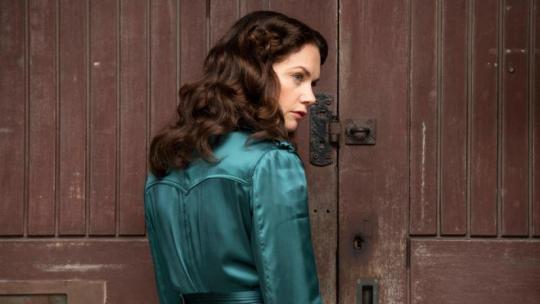
Feature
Books
Louisa Mellor
Nov 12, 2019
His Dark Materials
Ruth Wilson
from Books https://ift.tt/2CEdwmE
0 notes